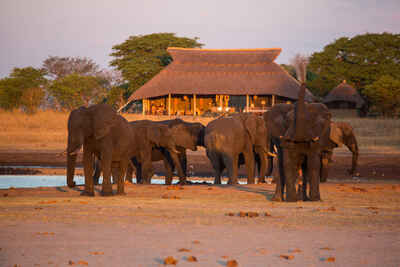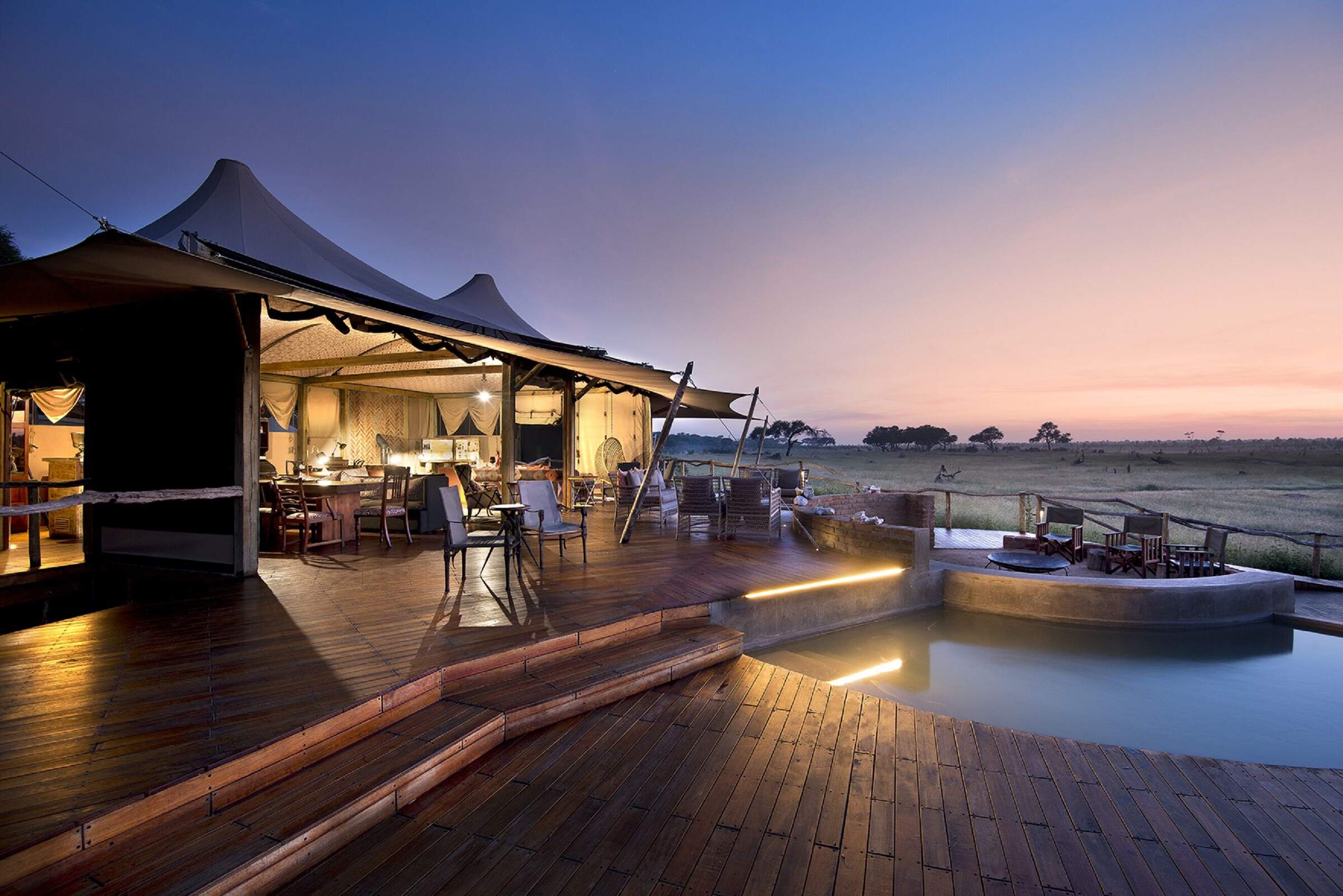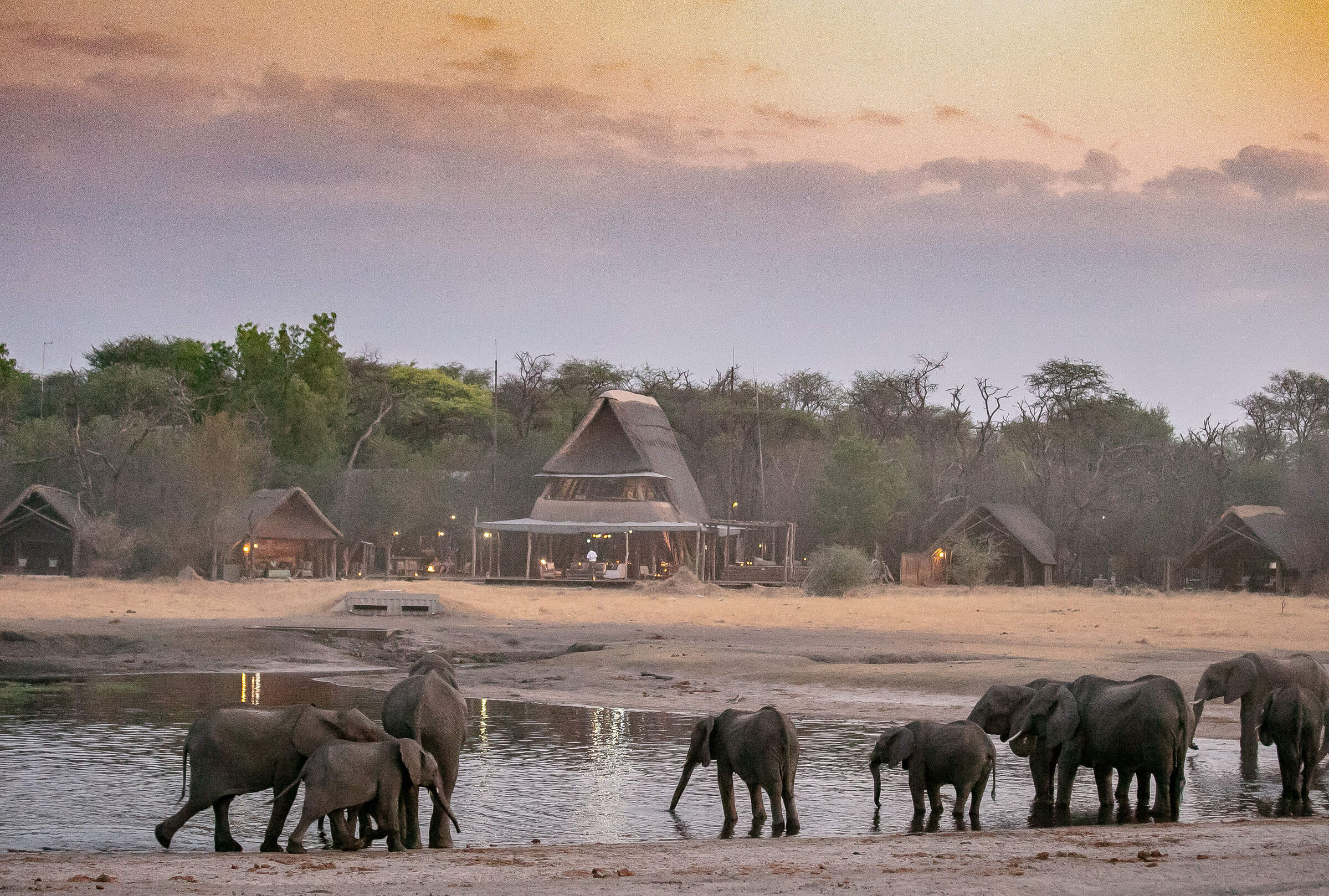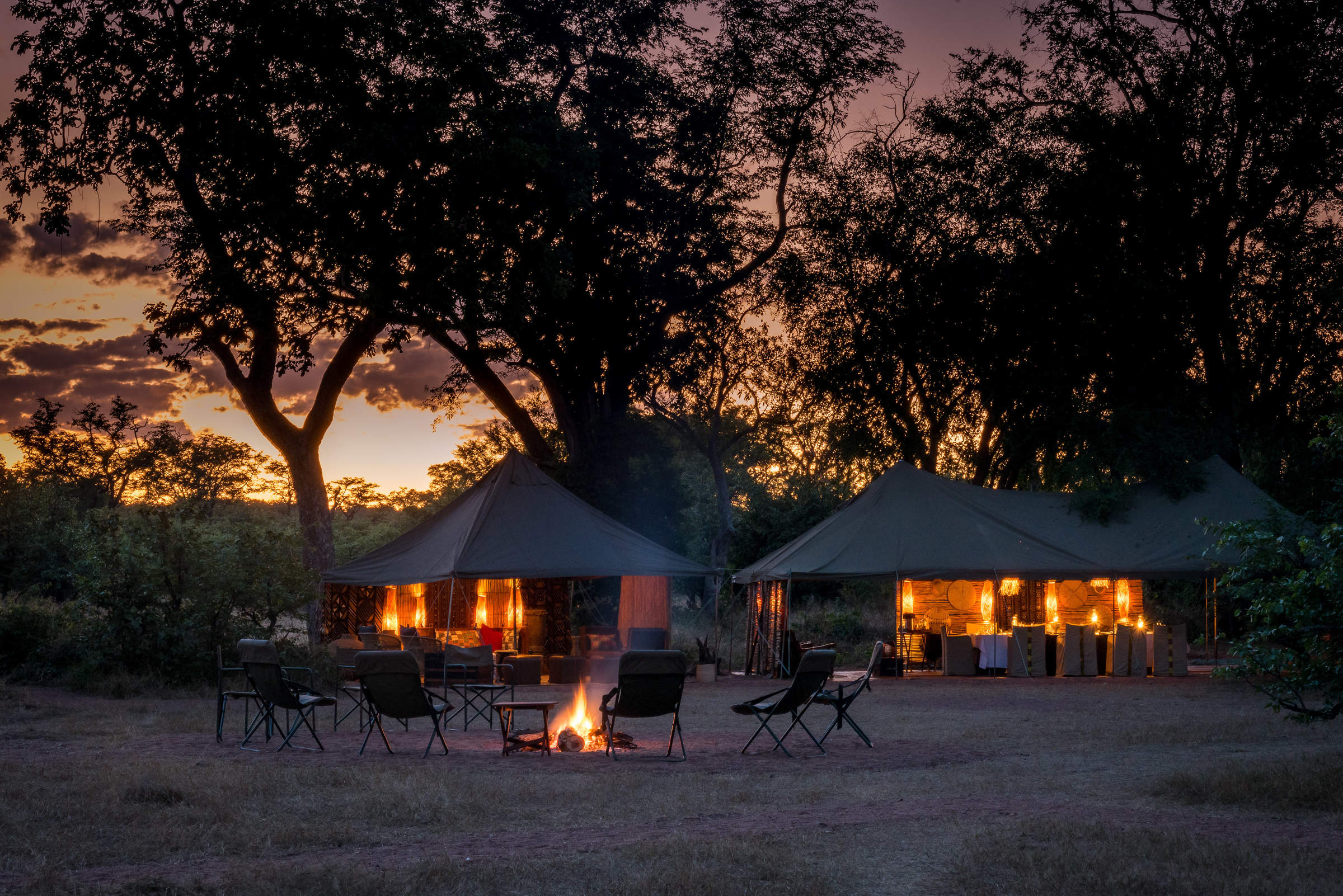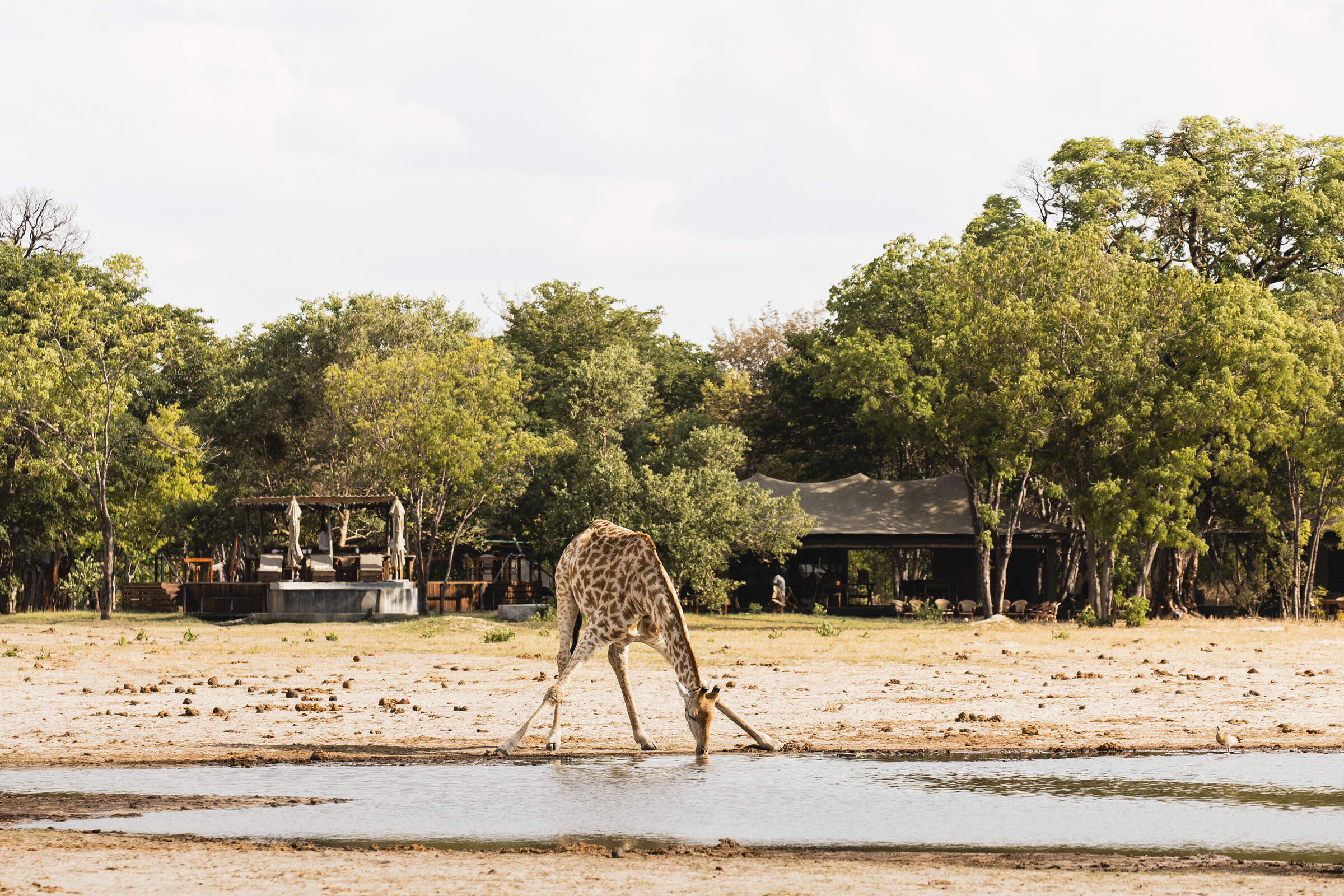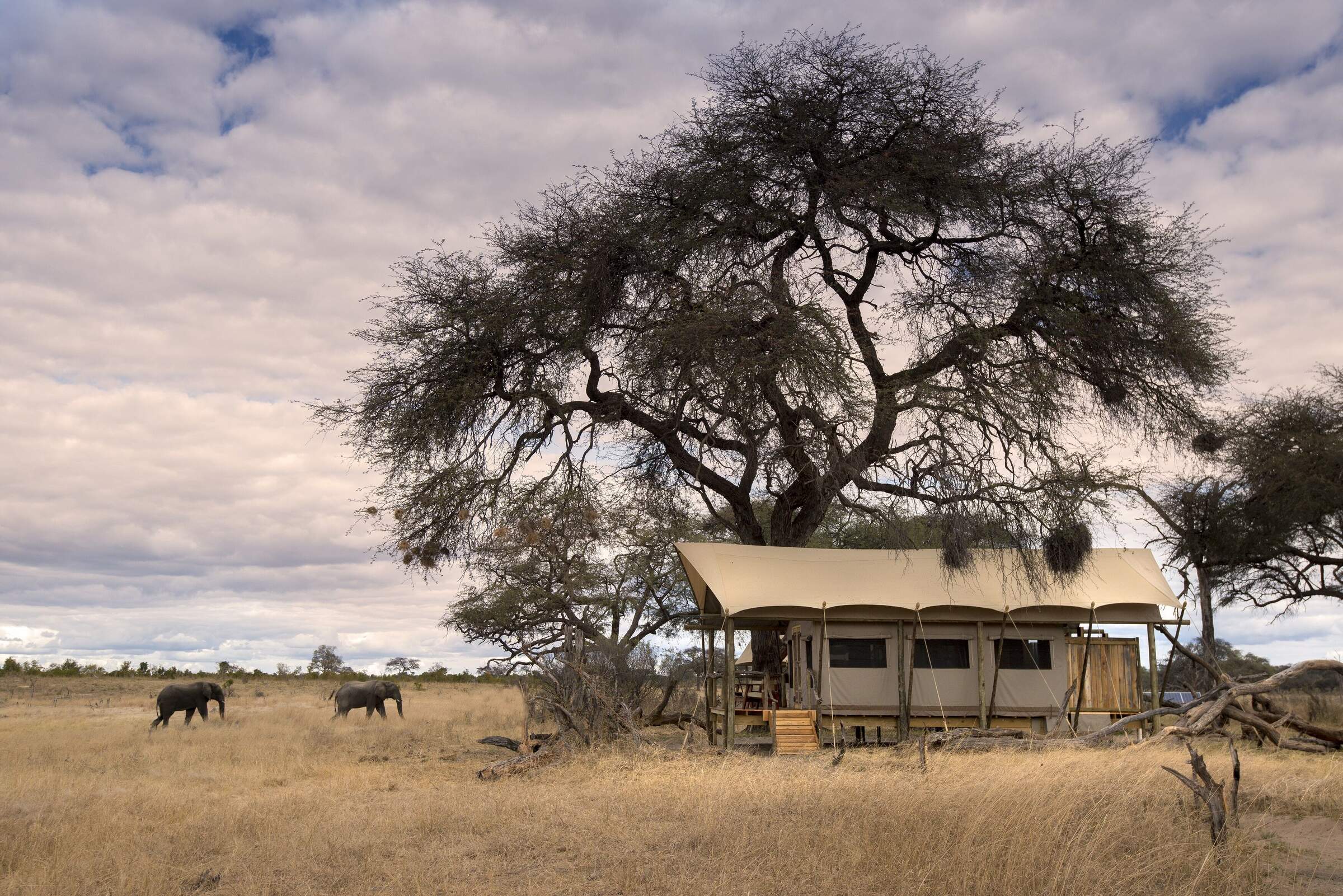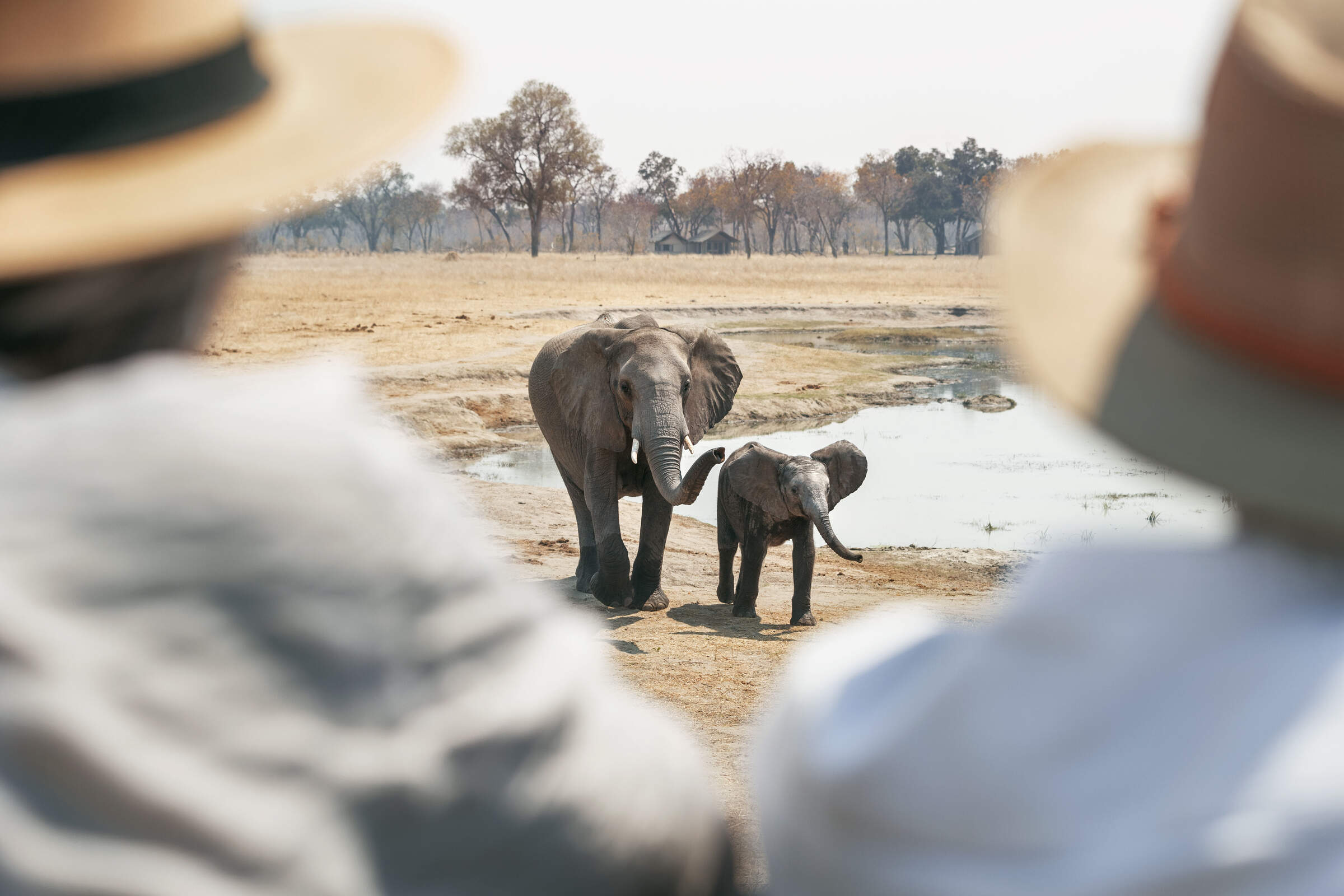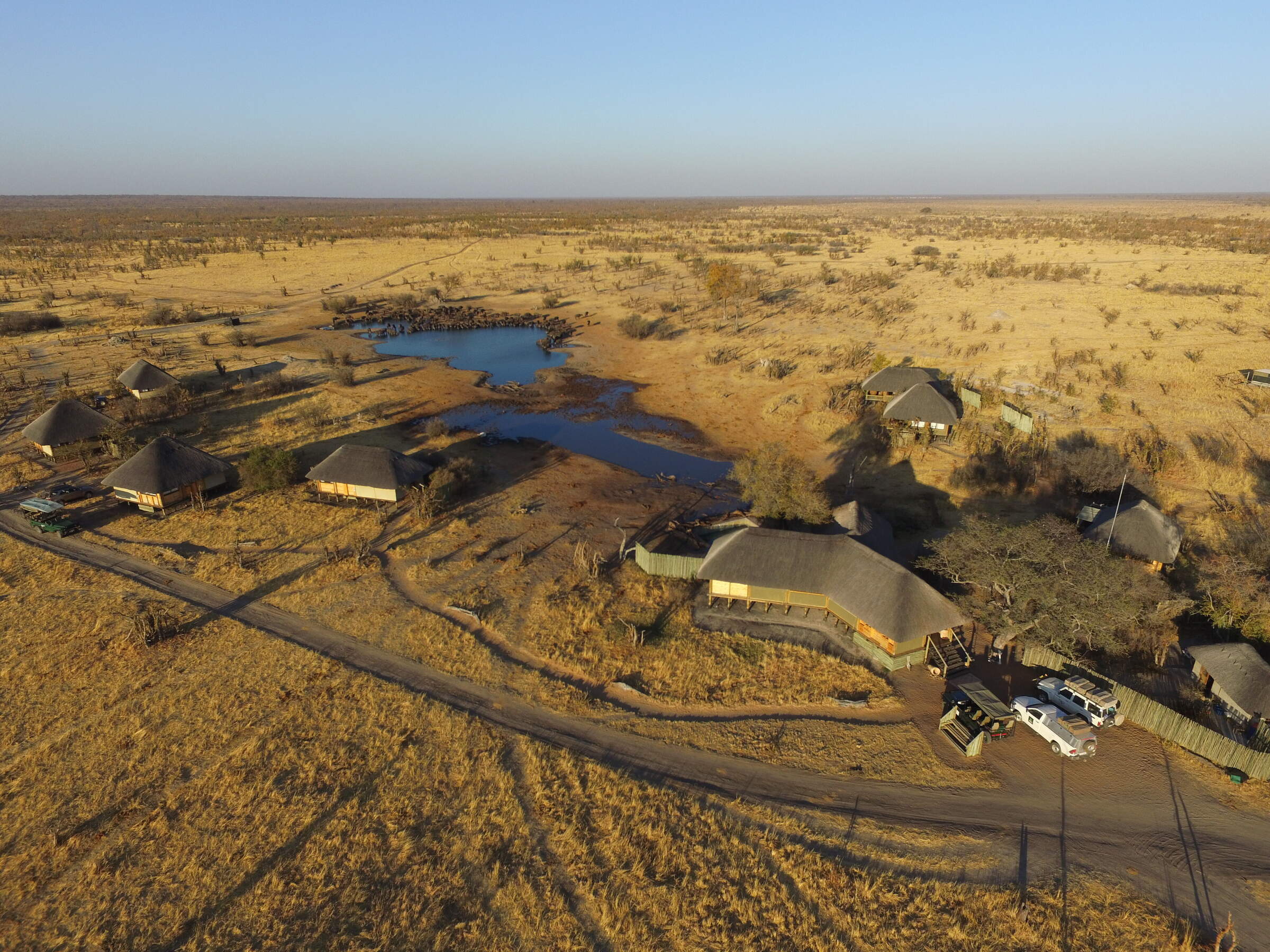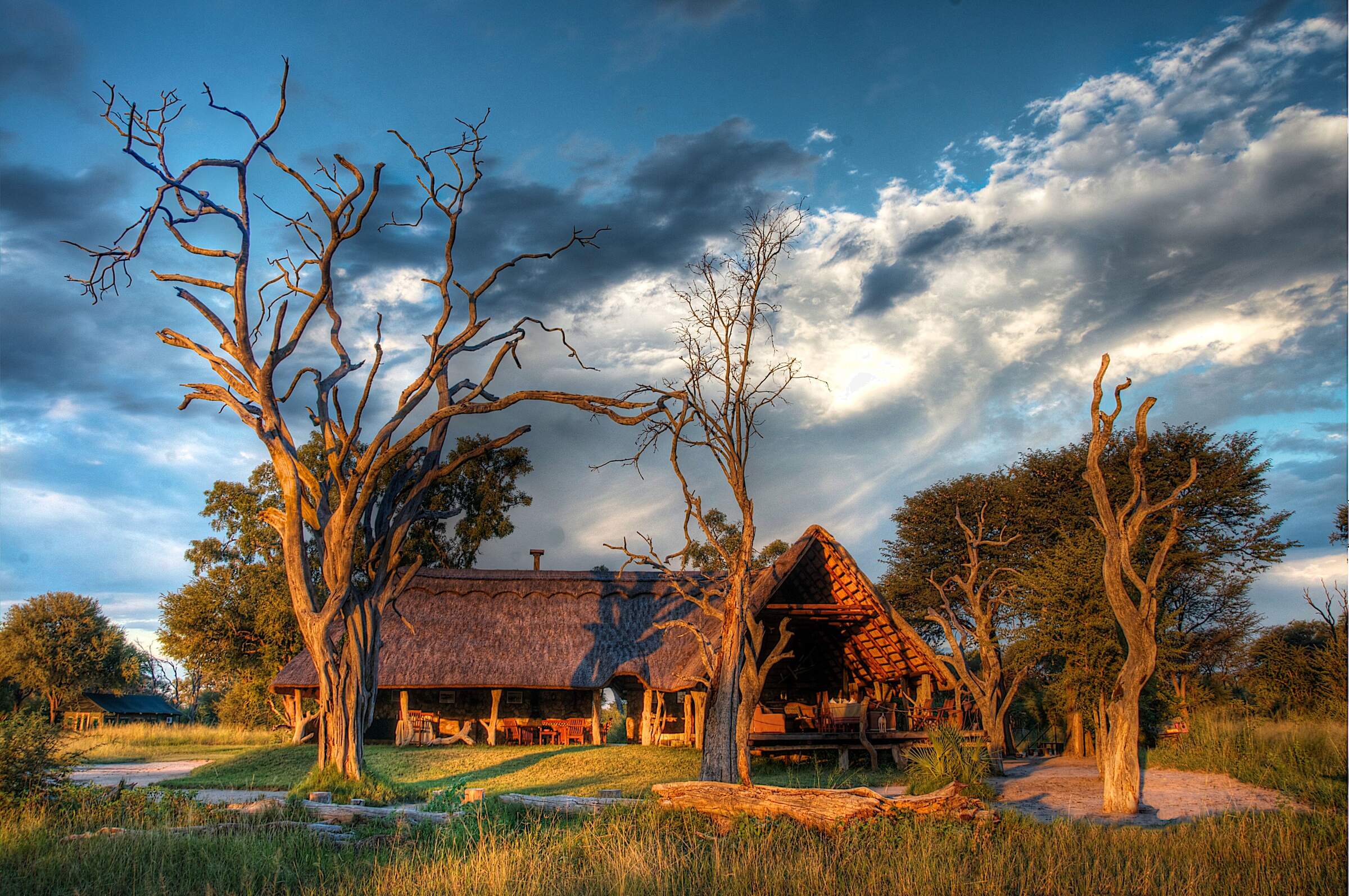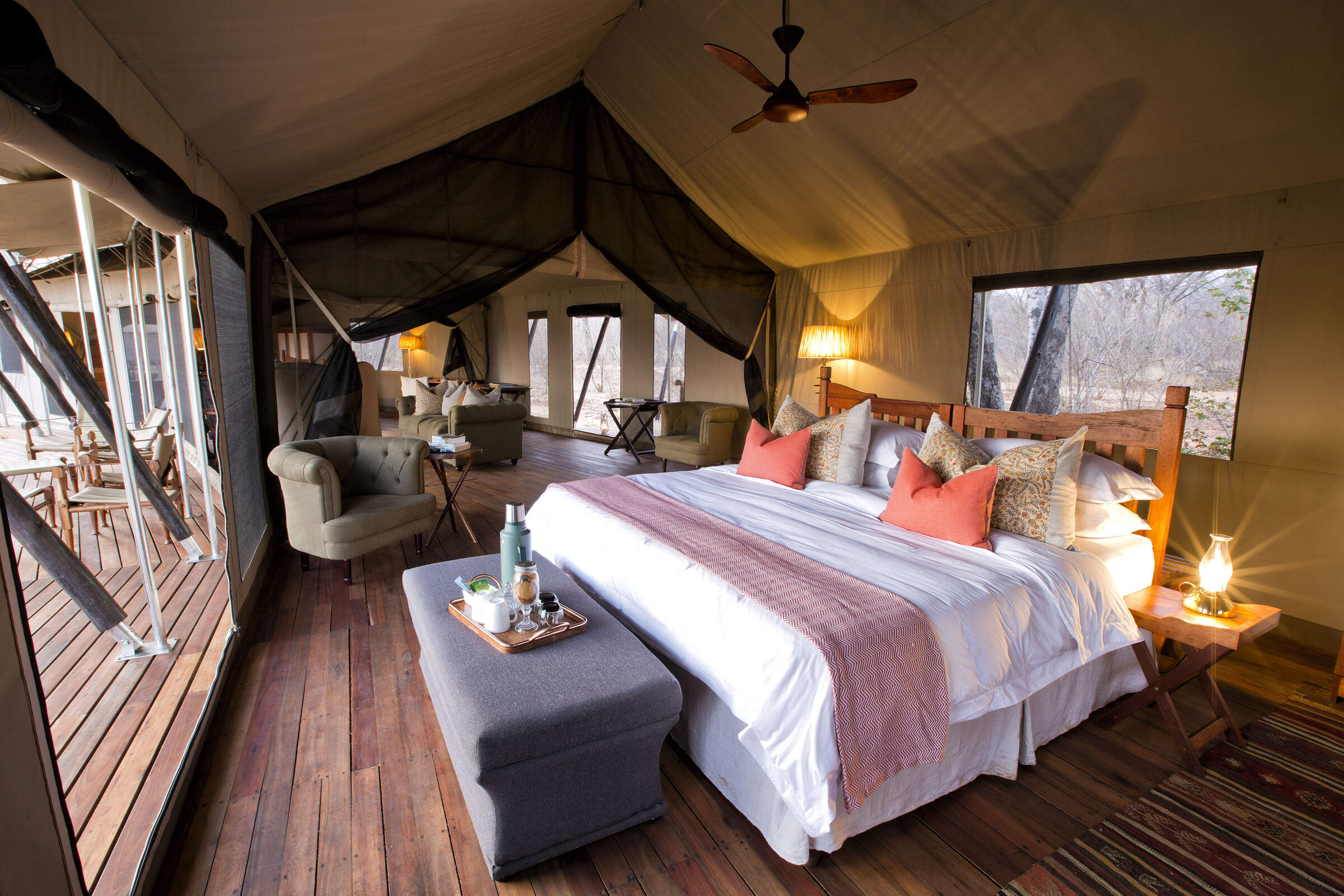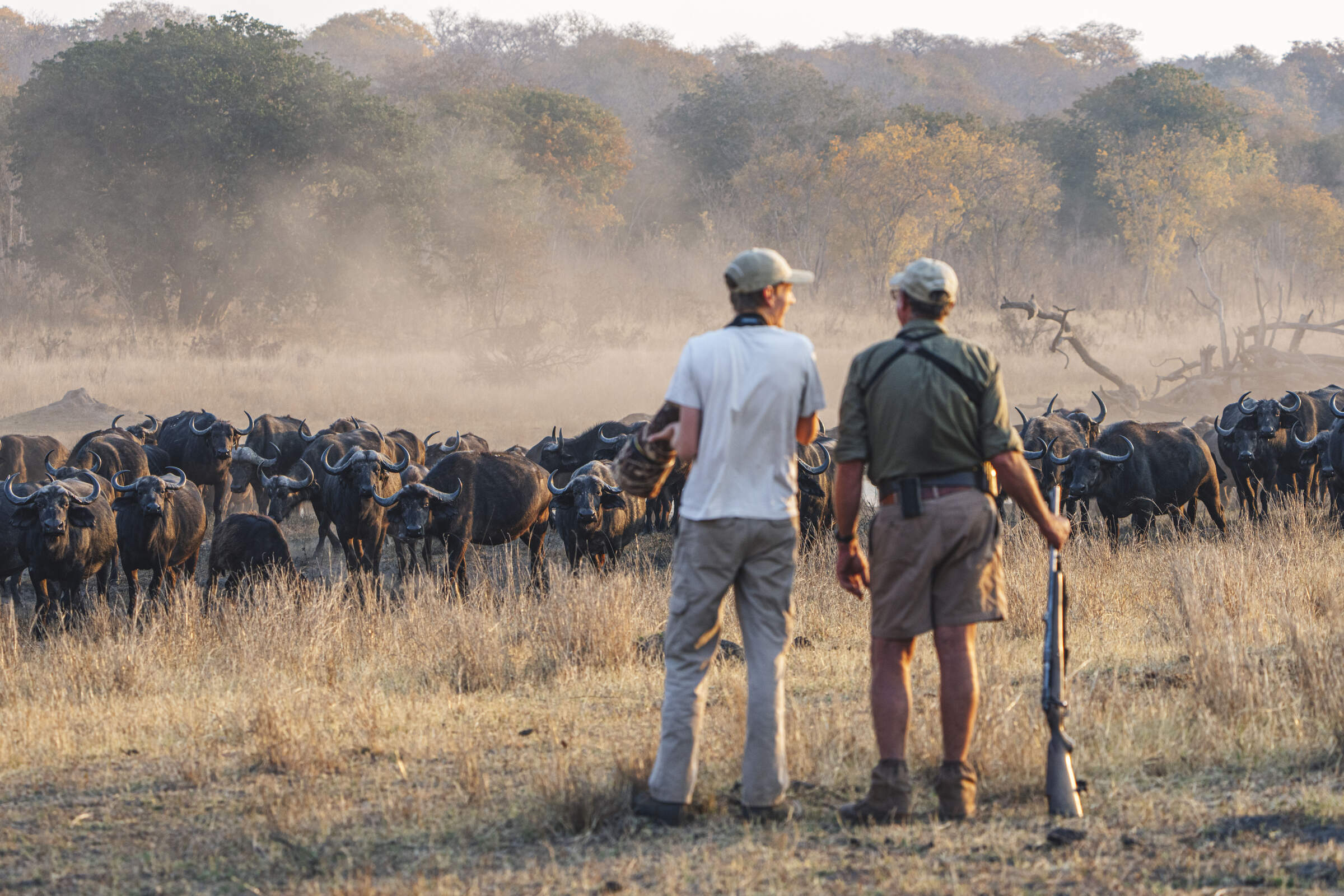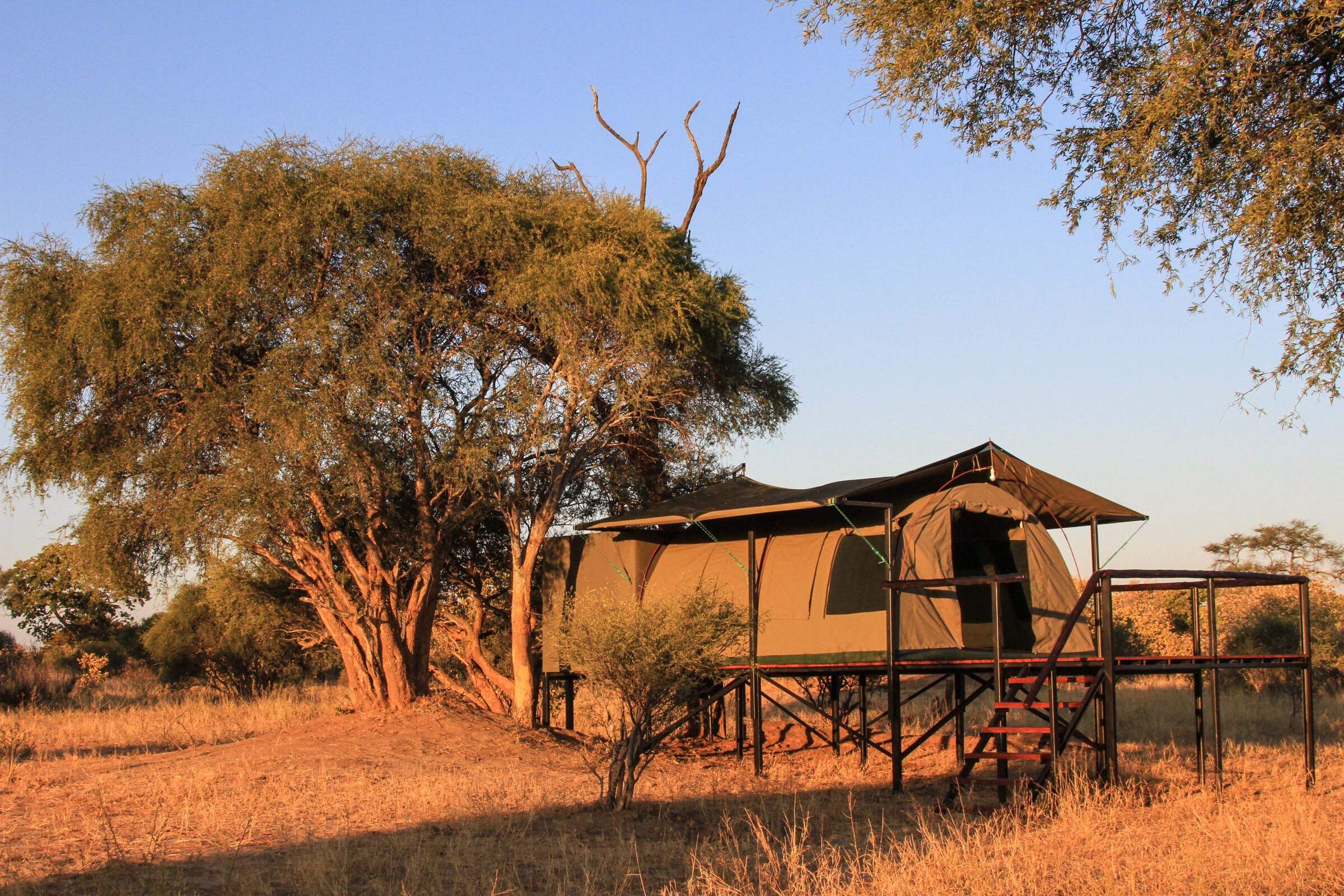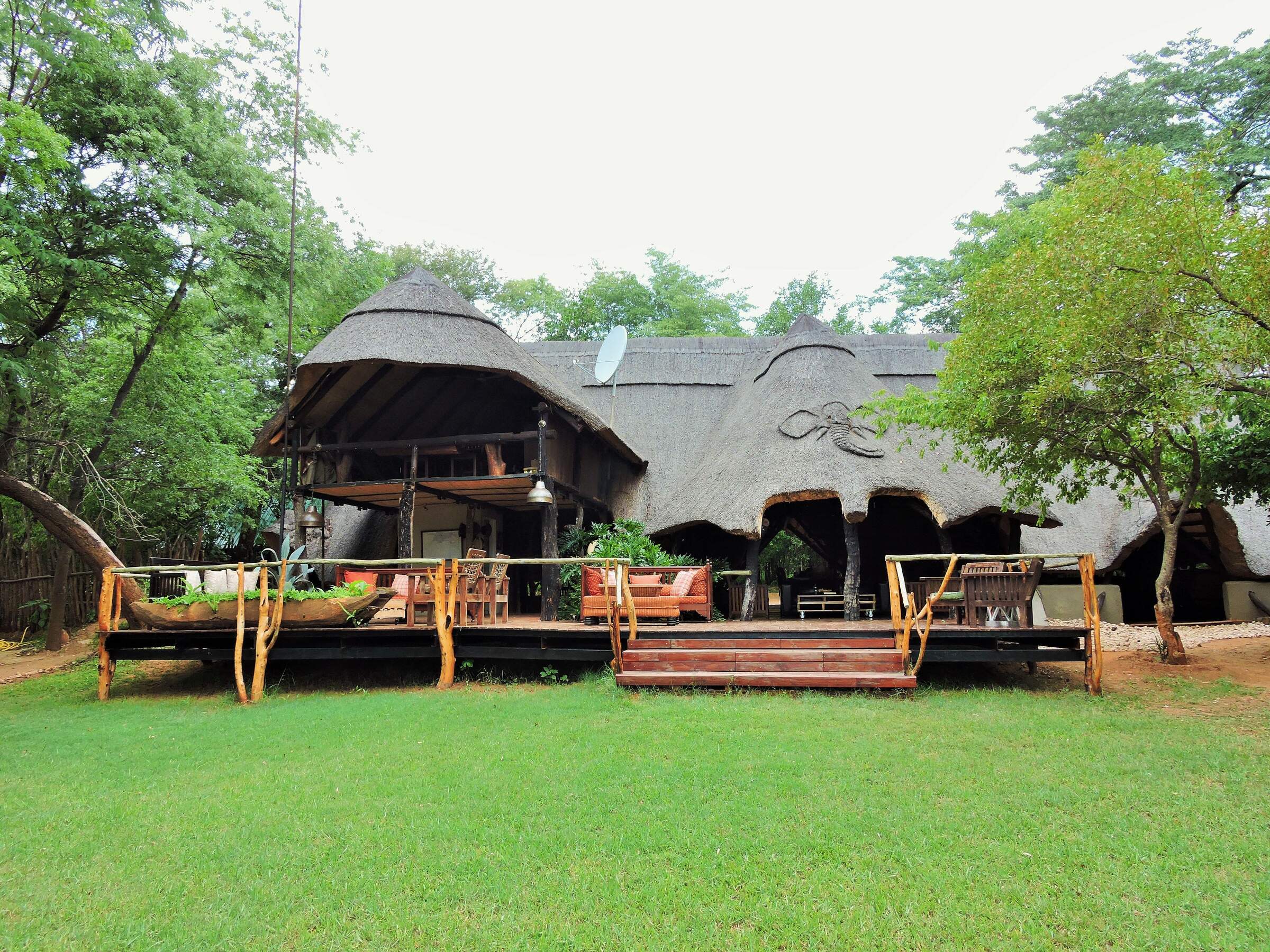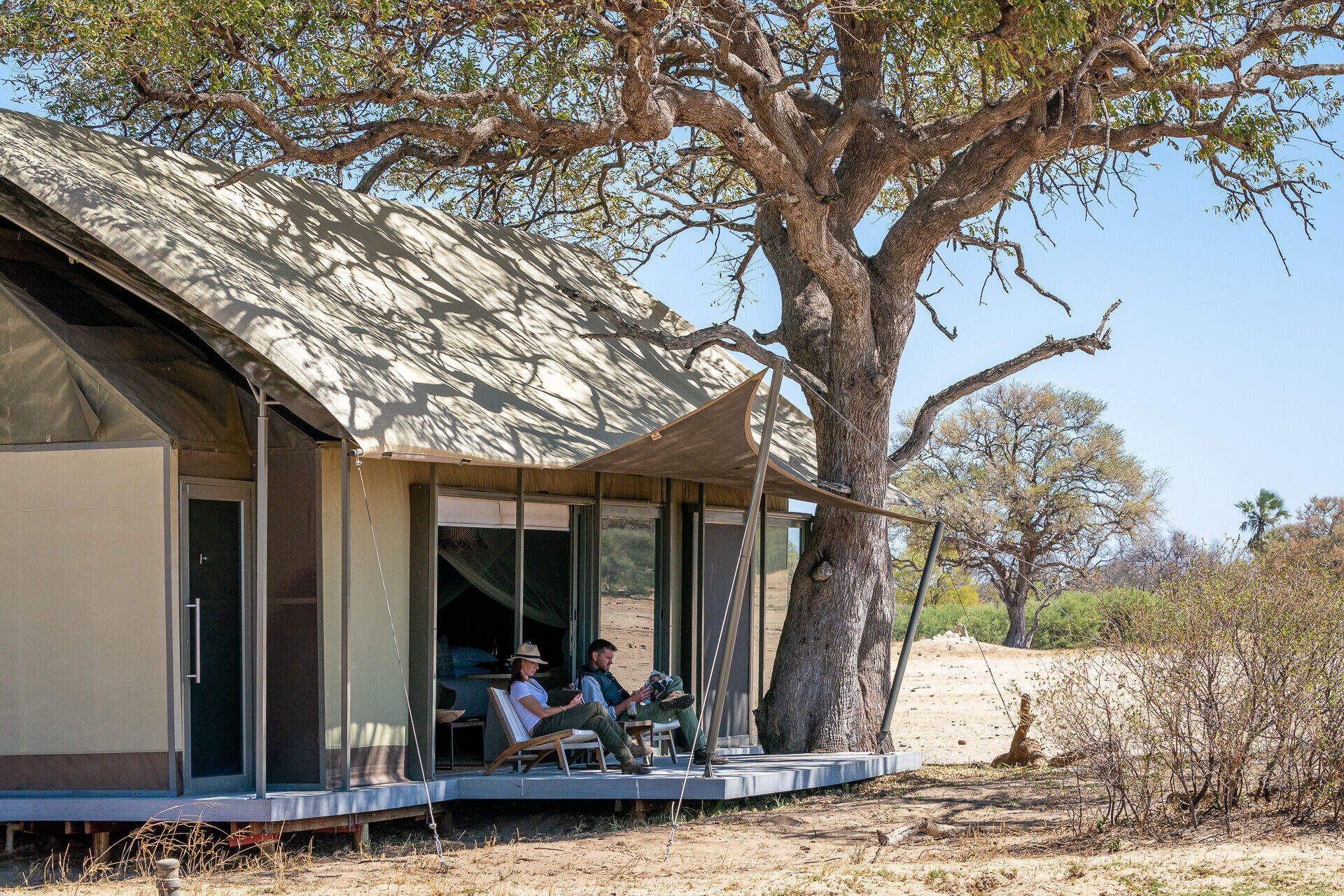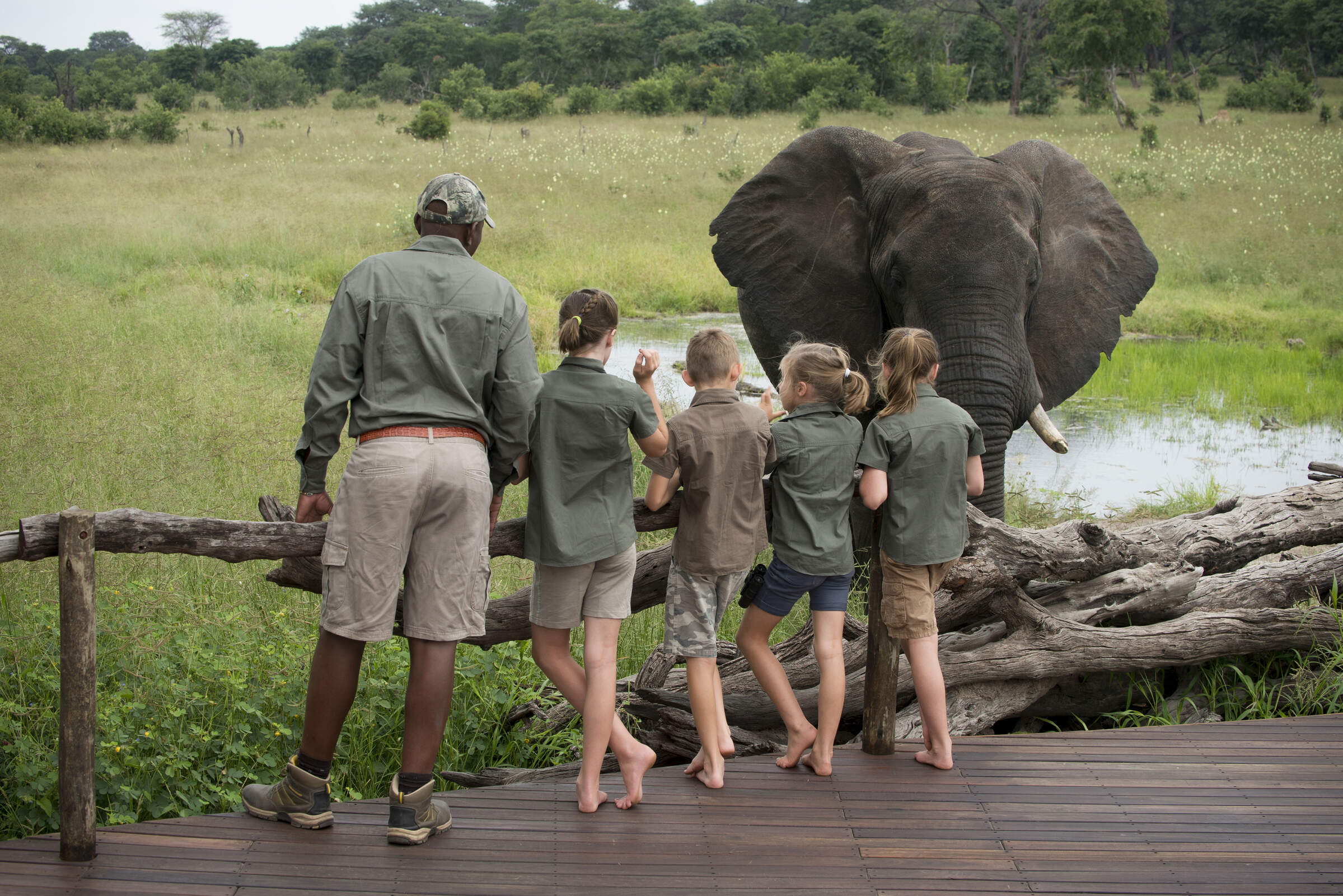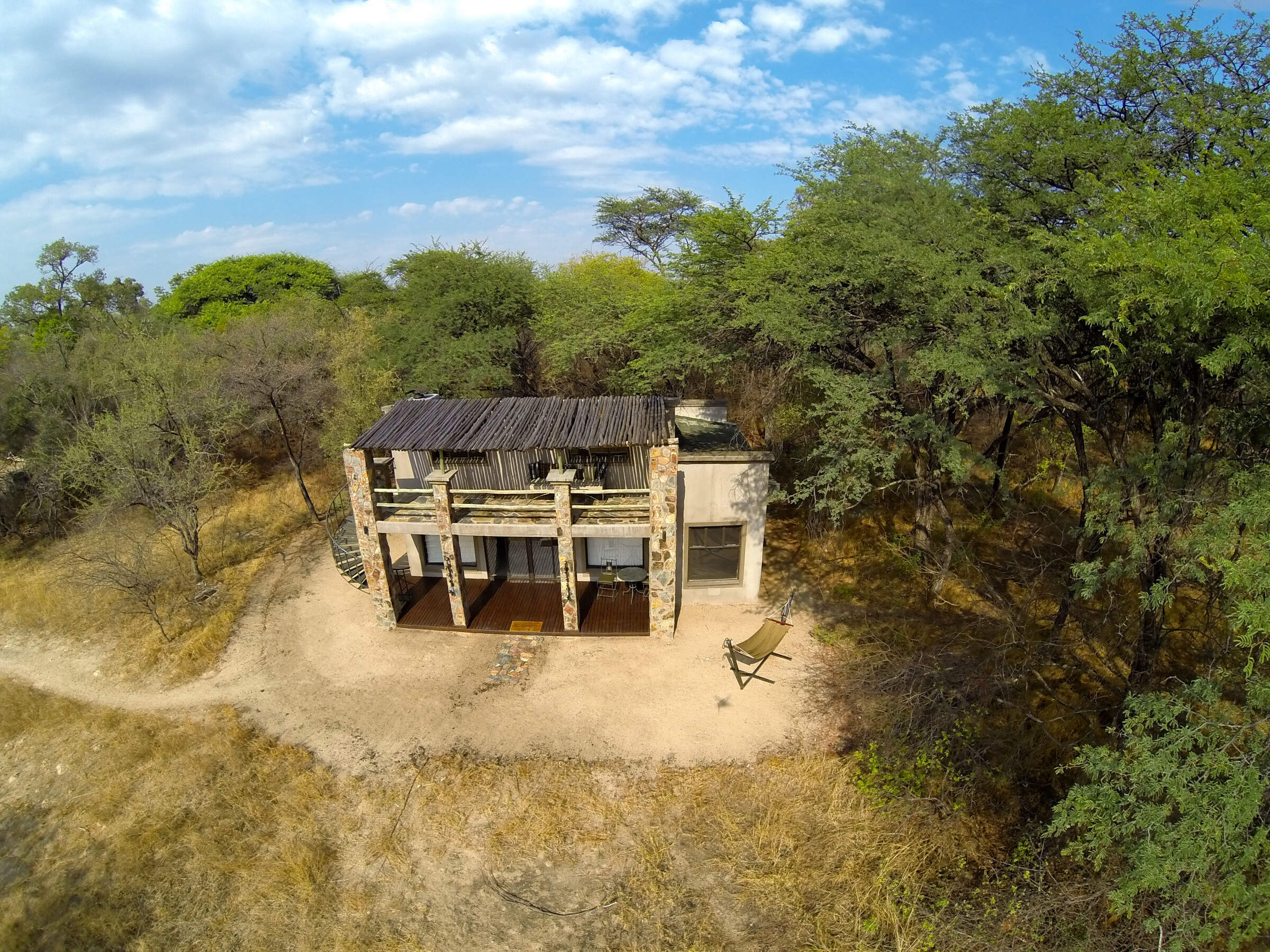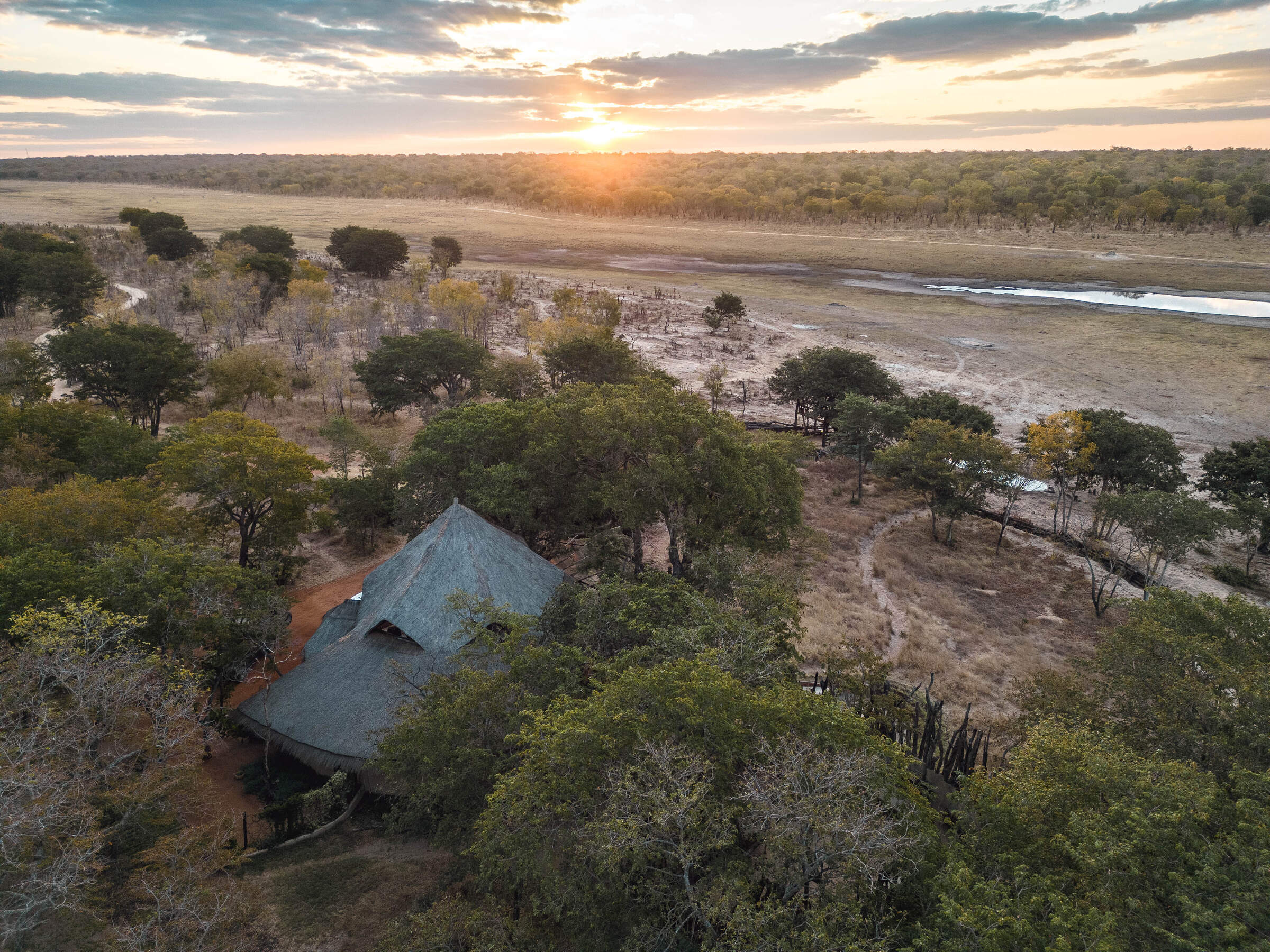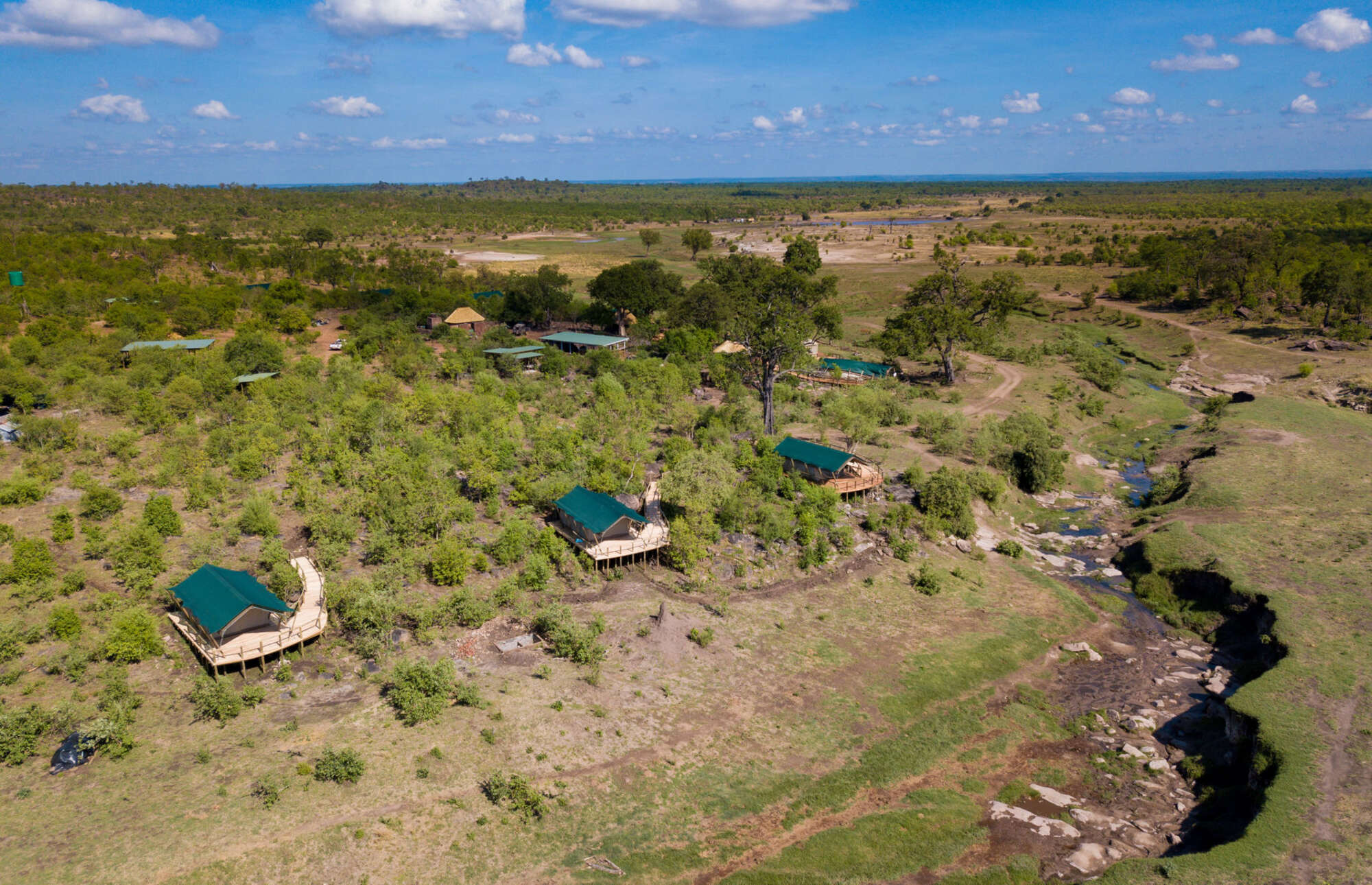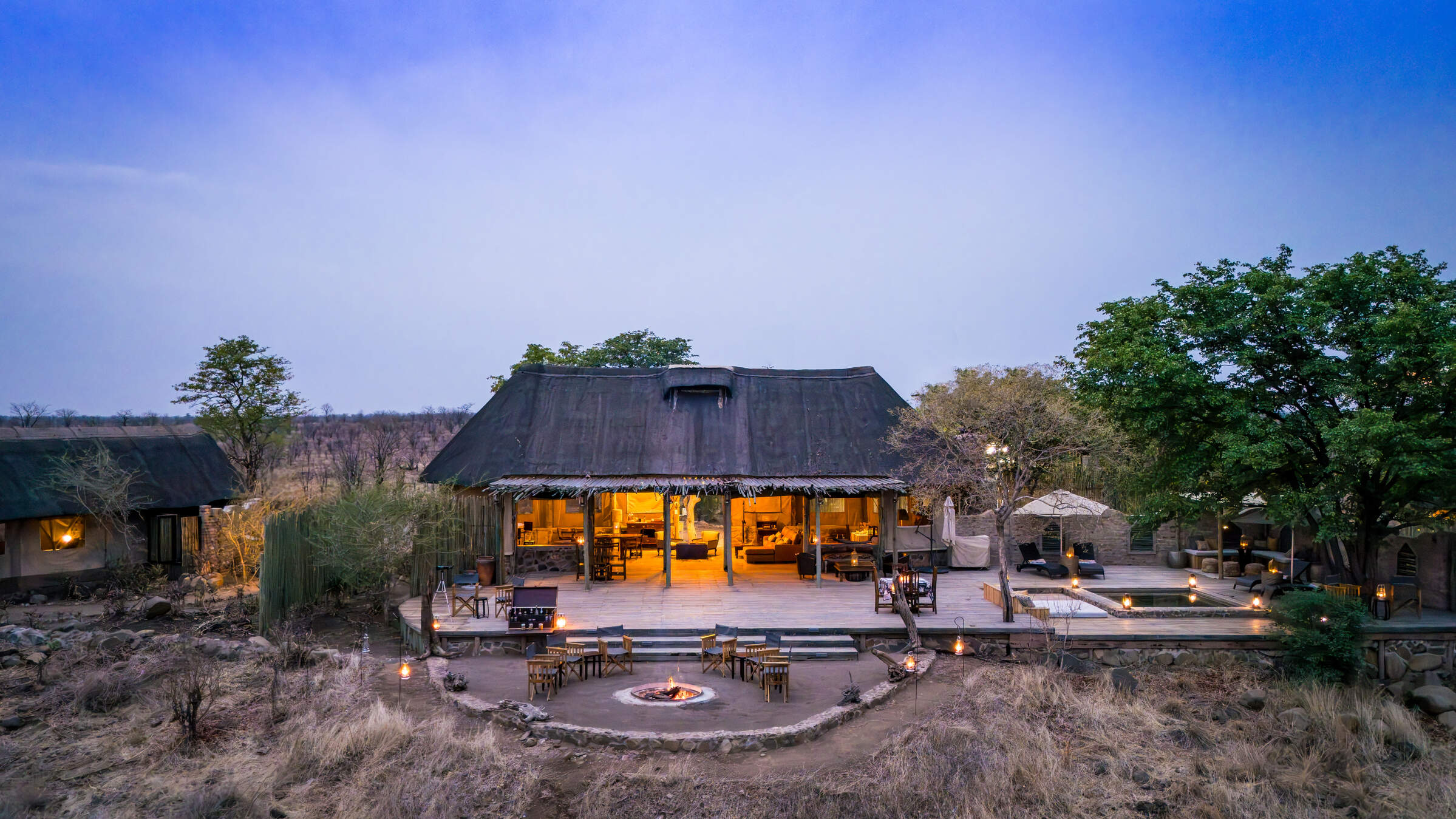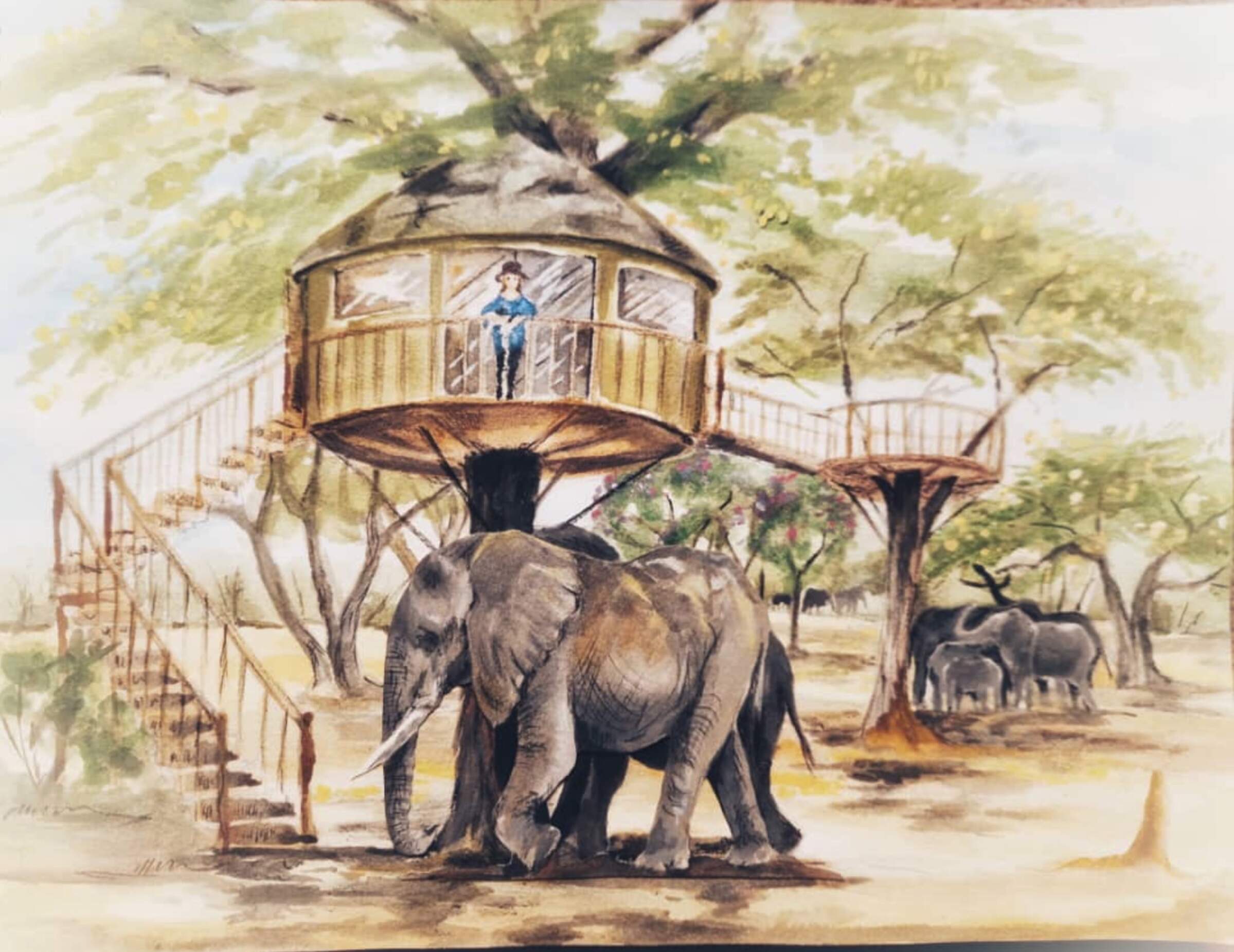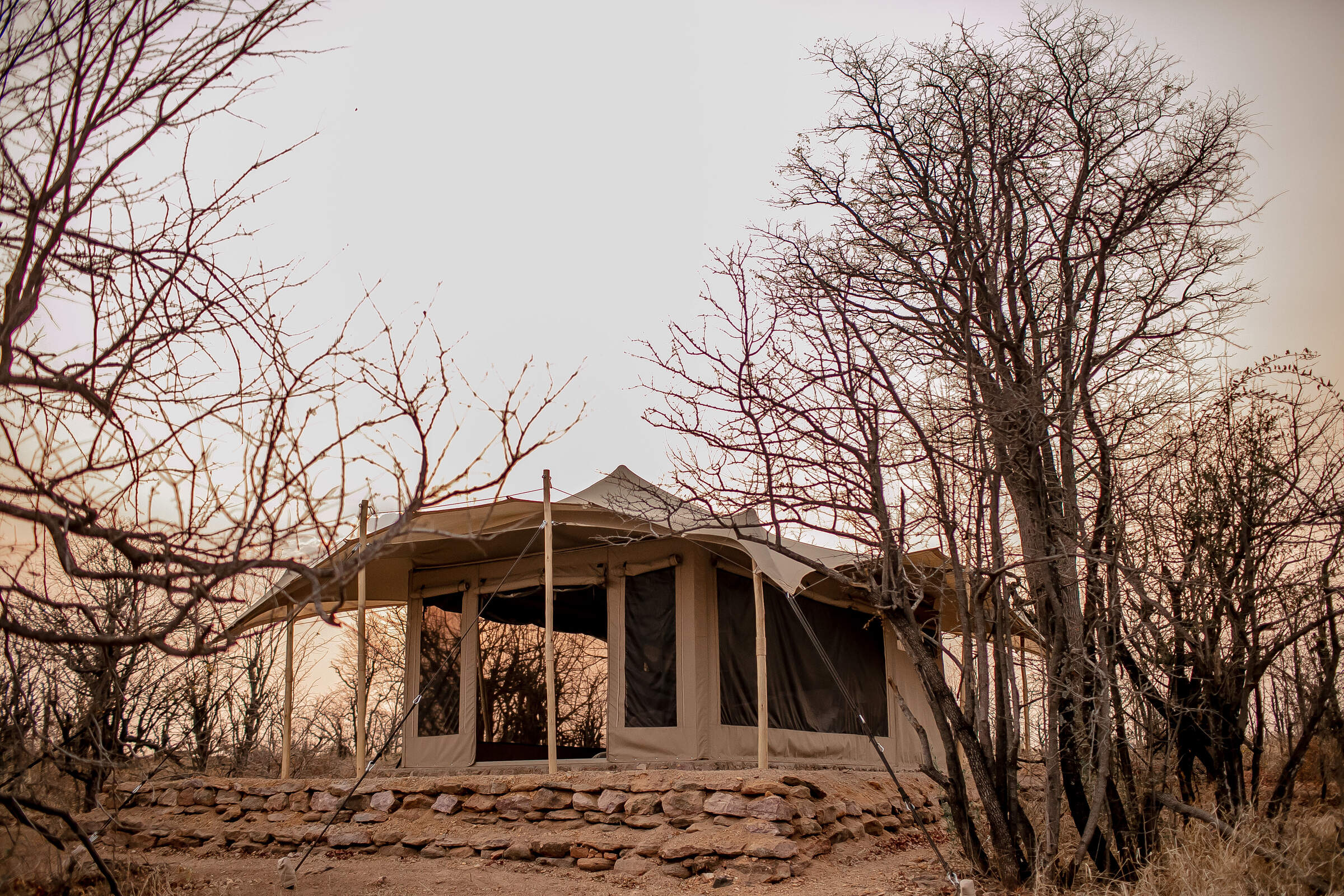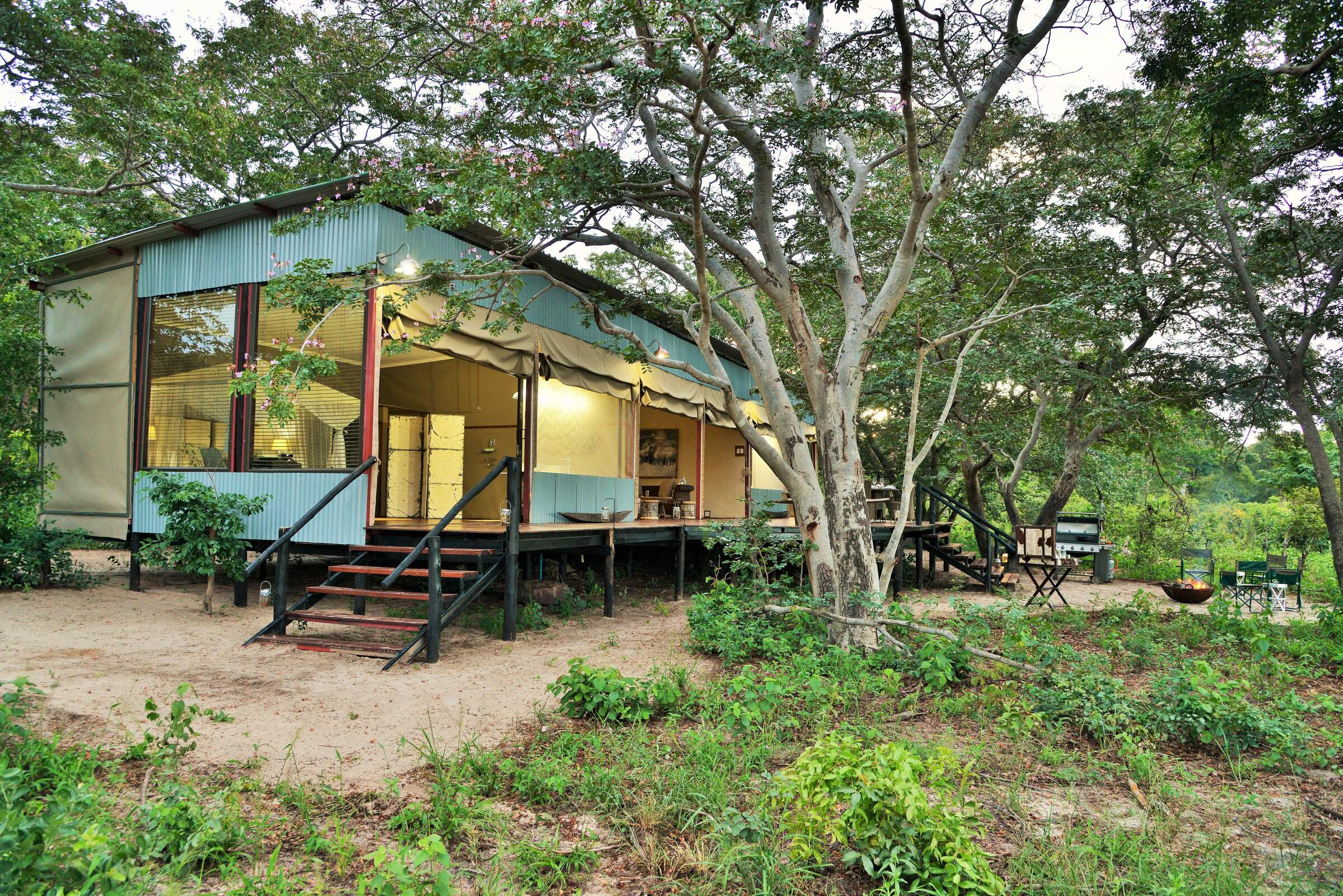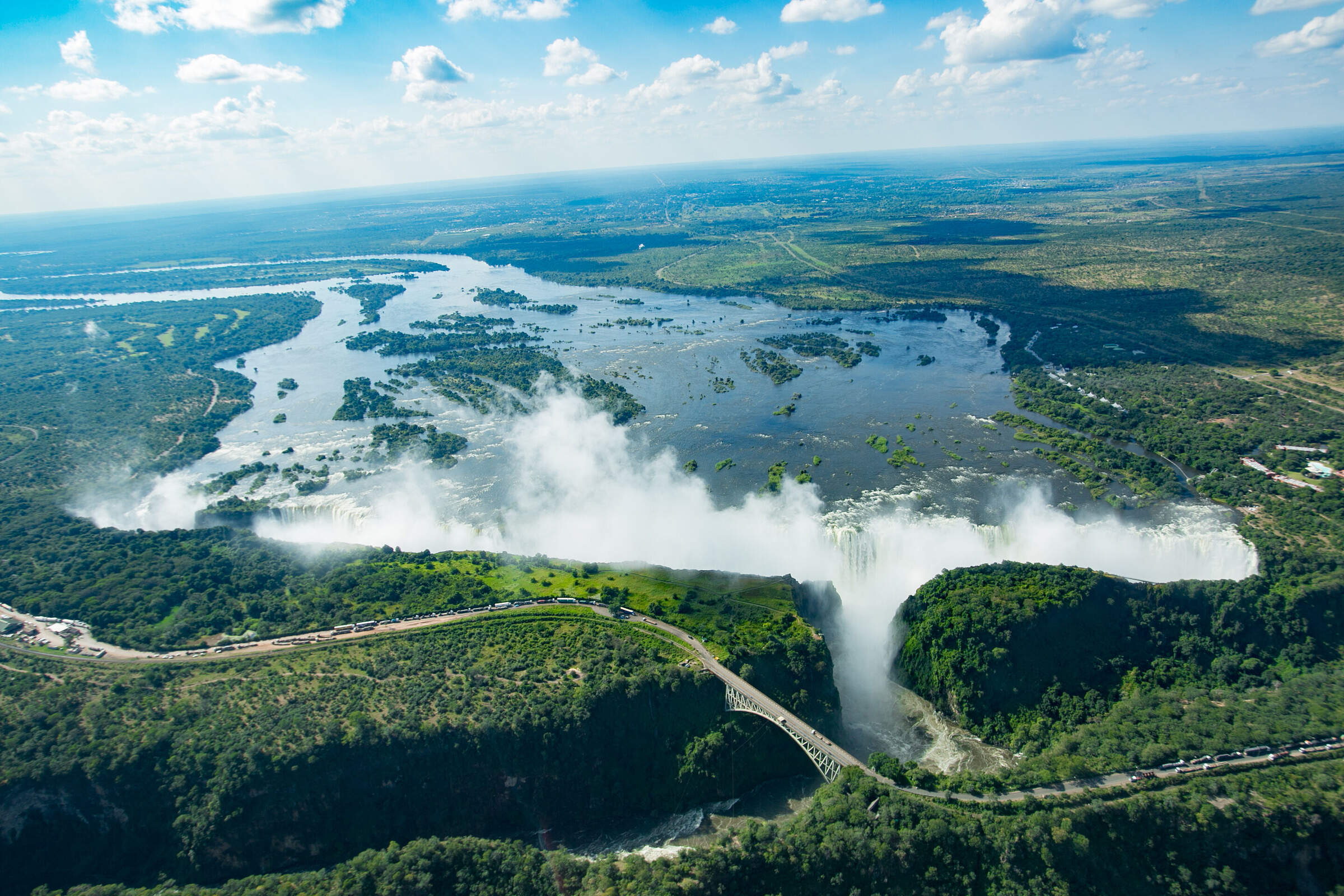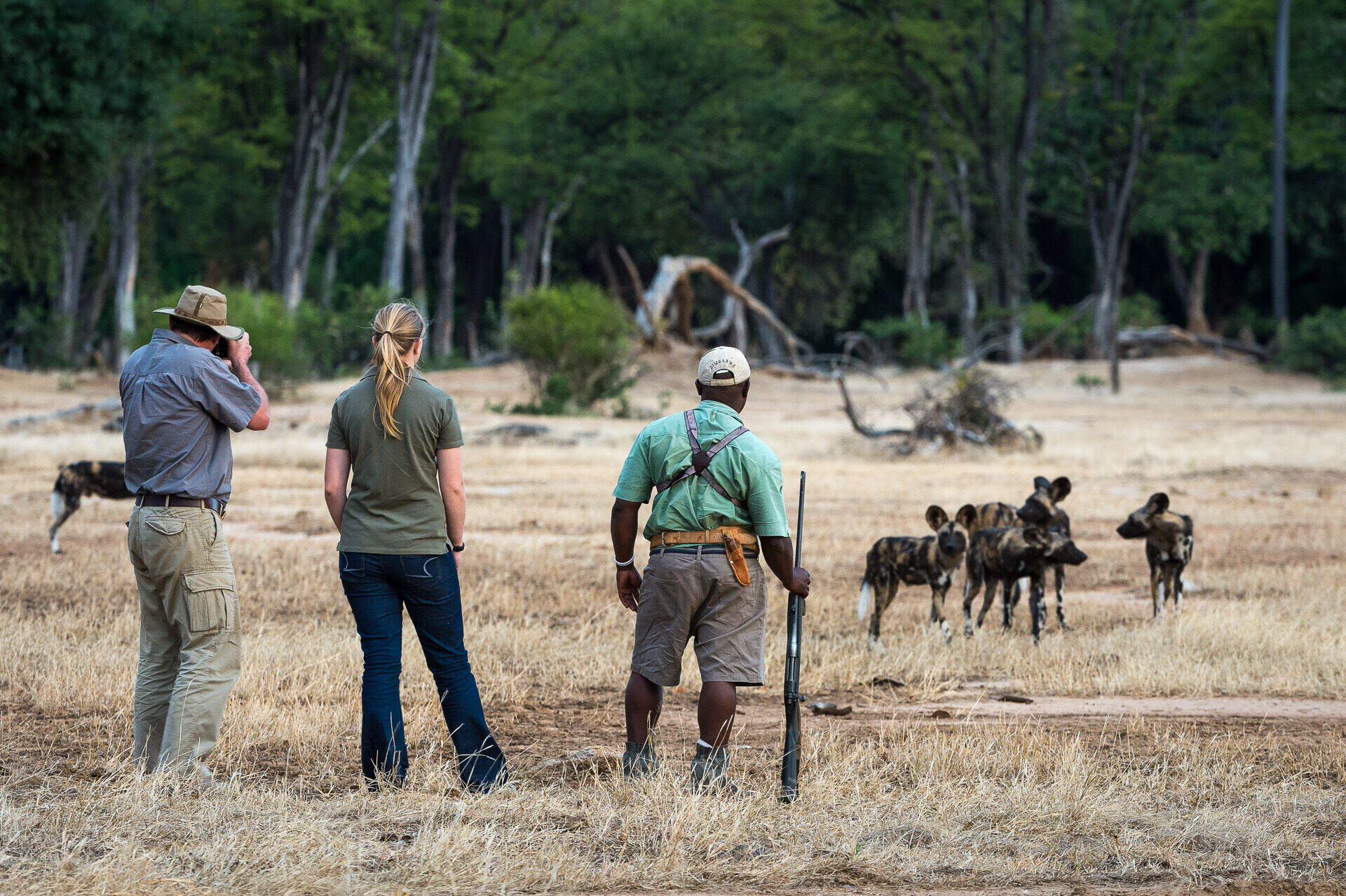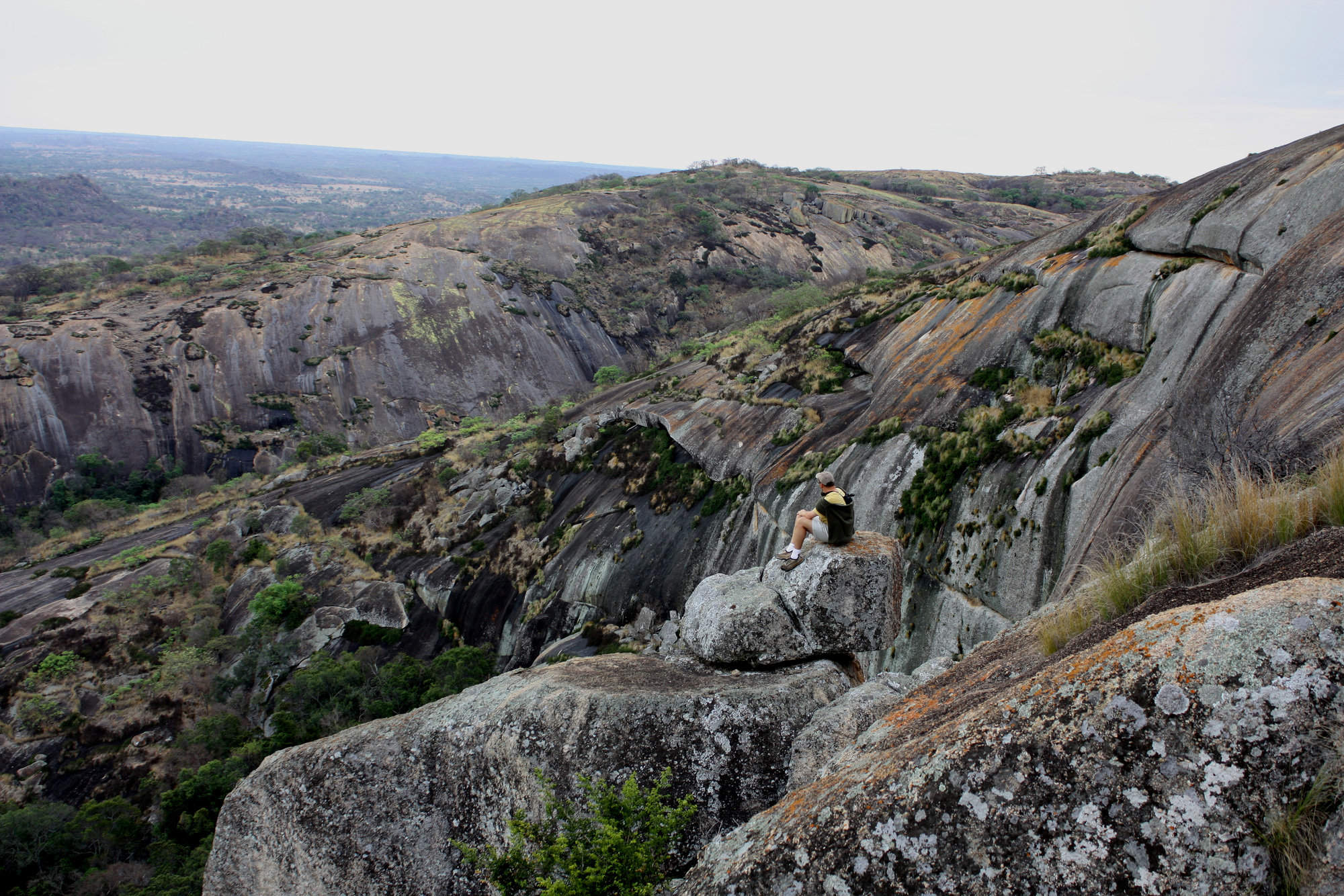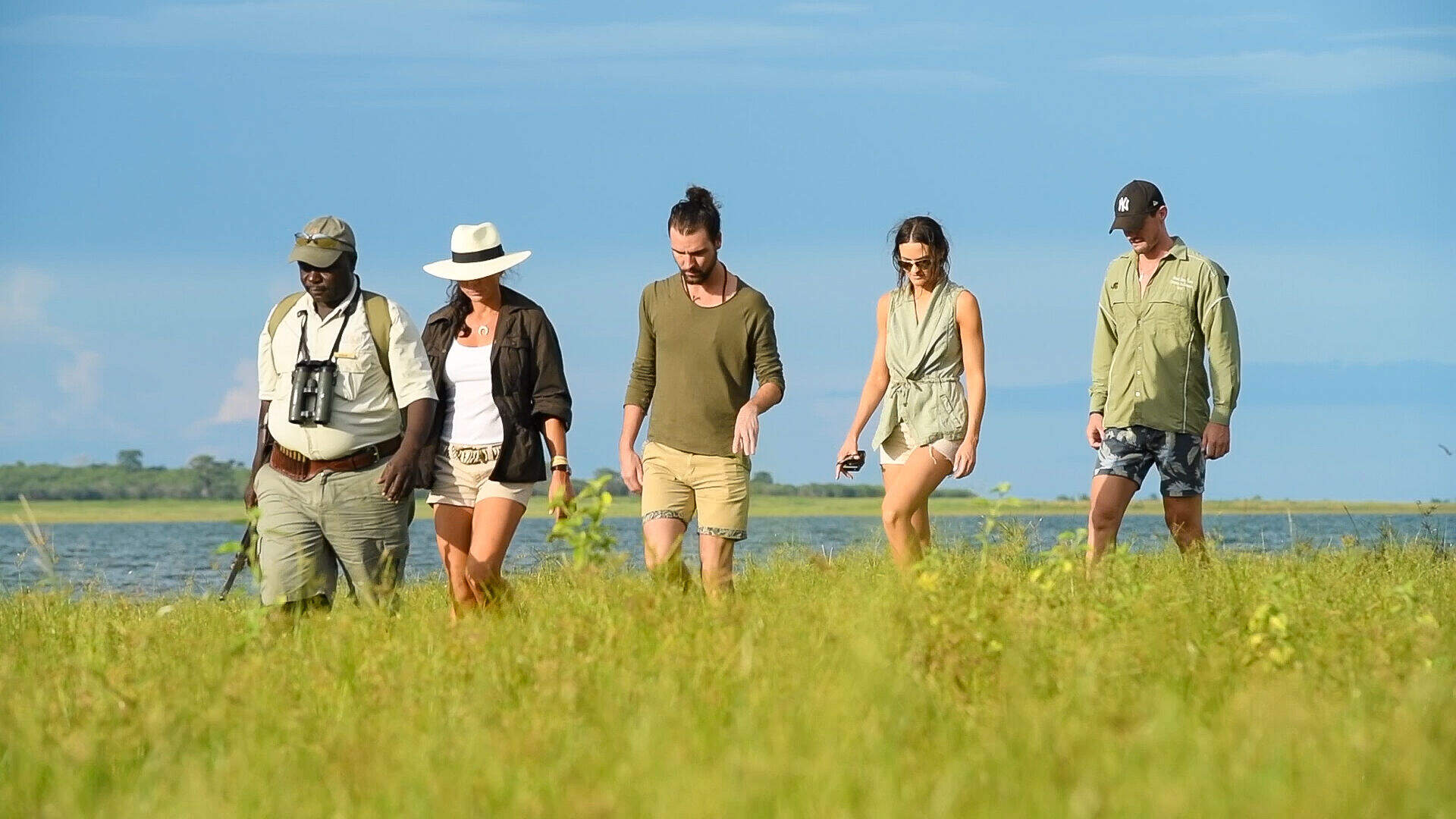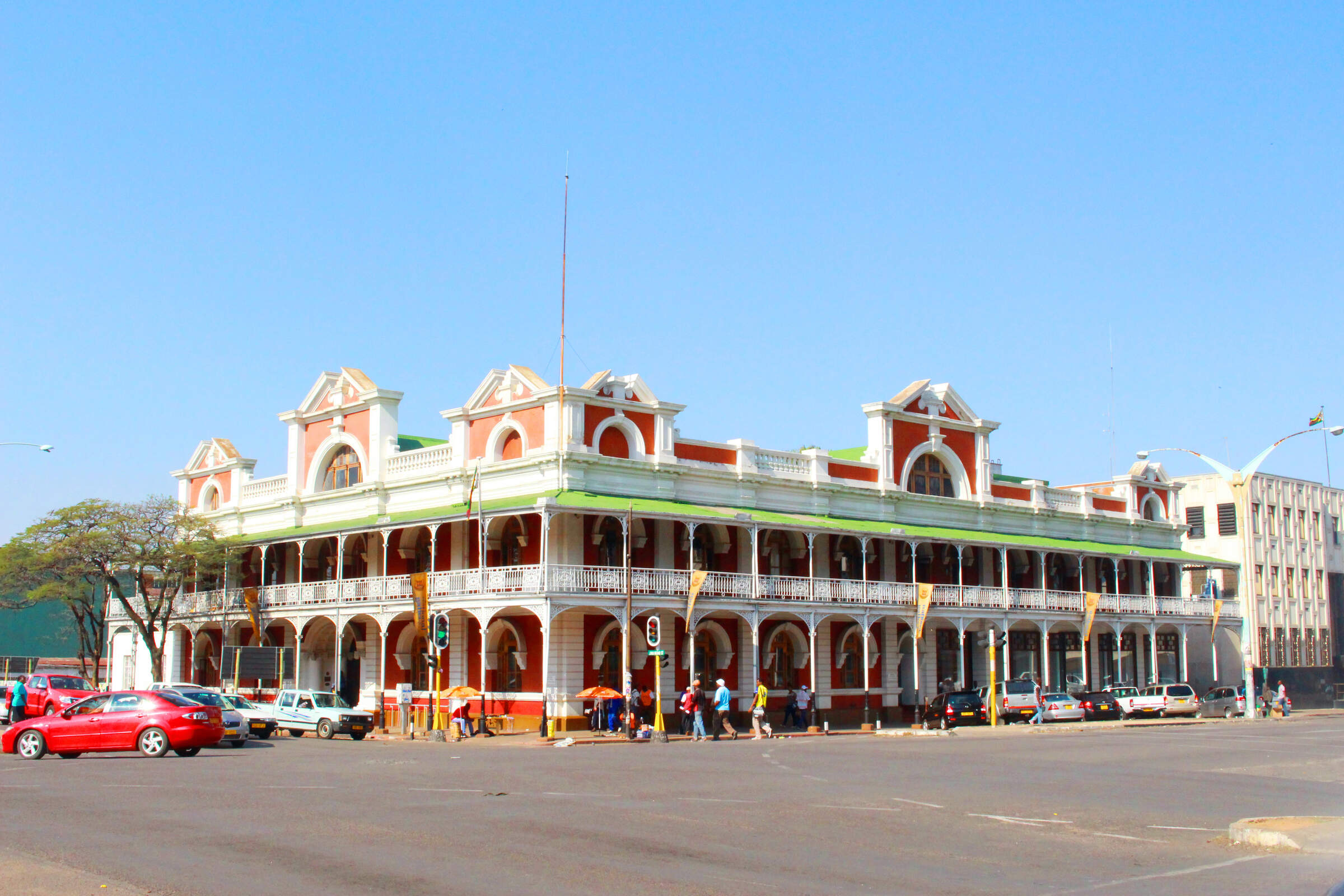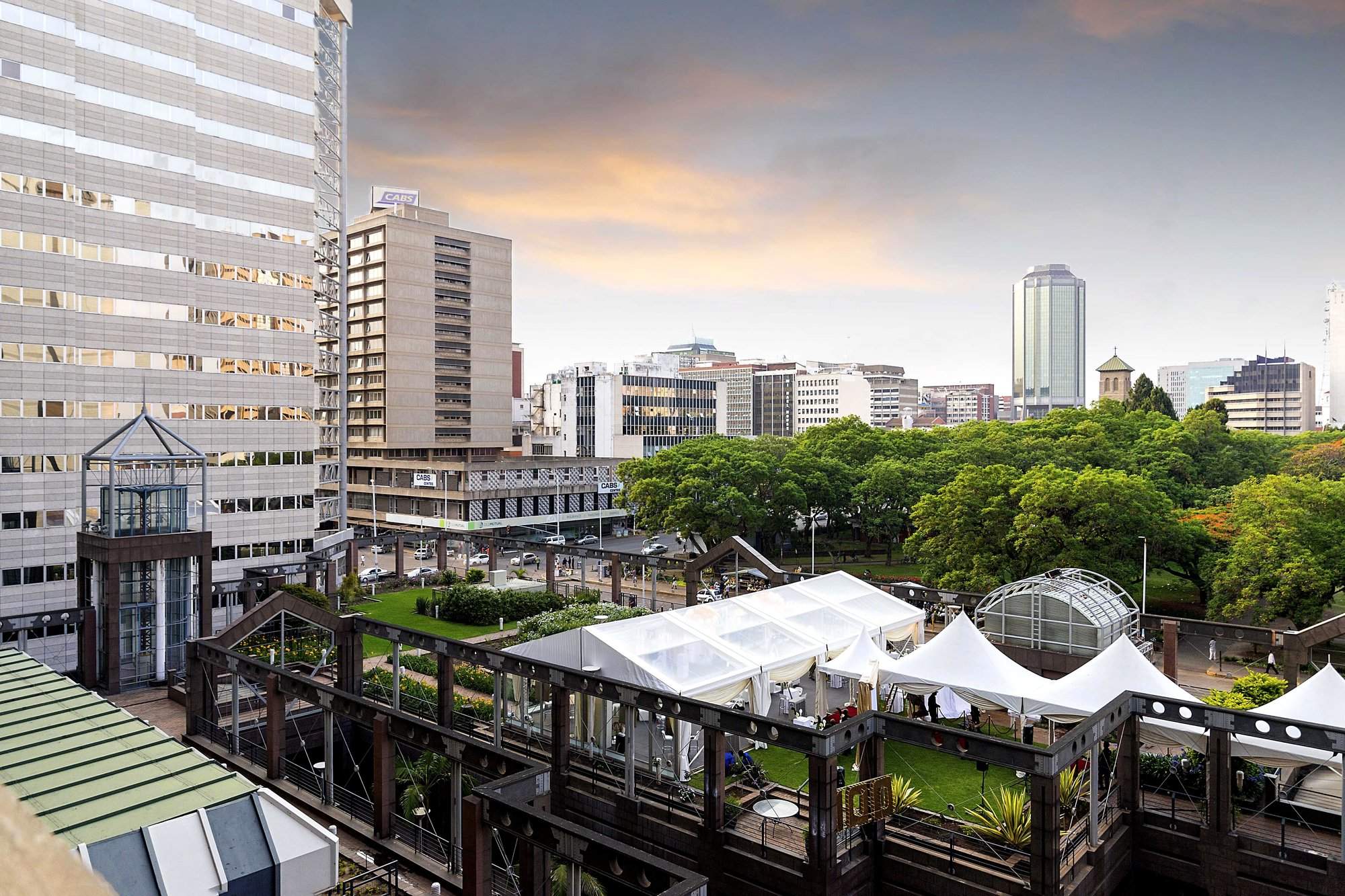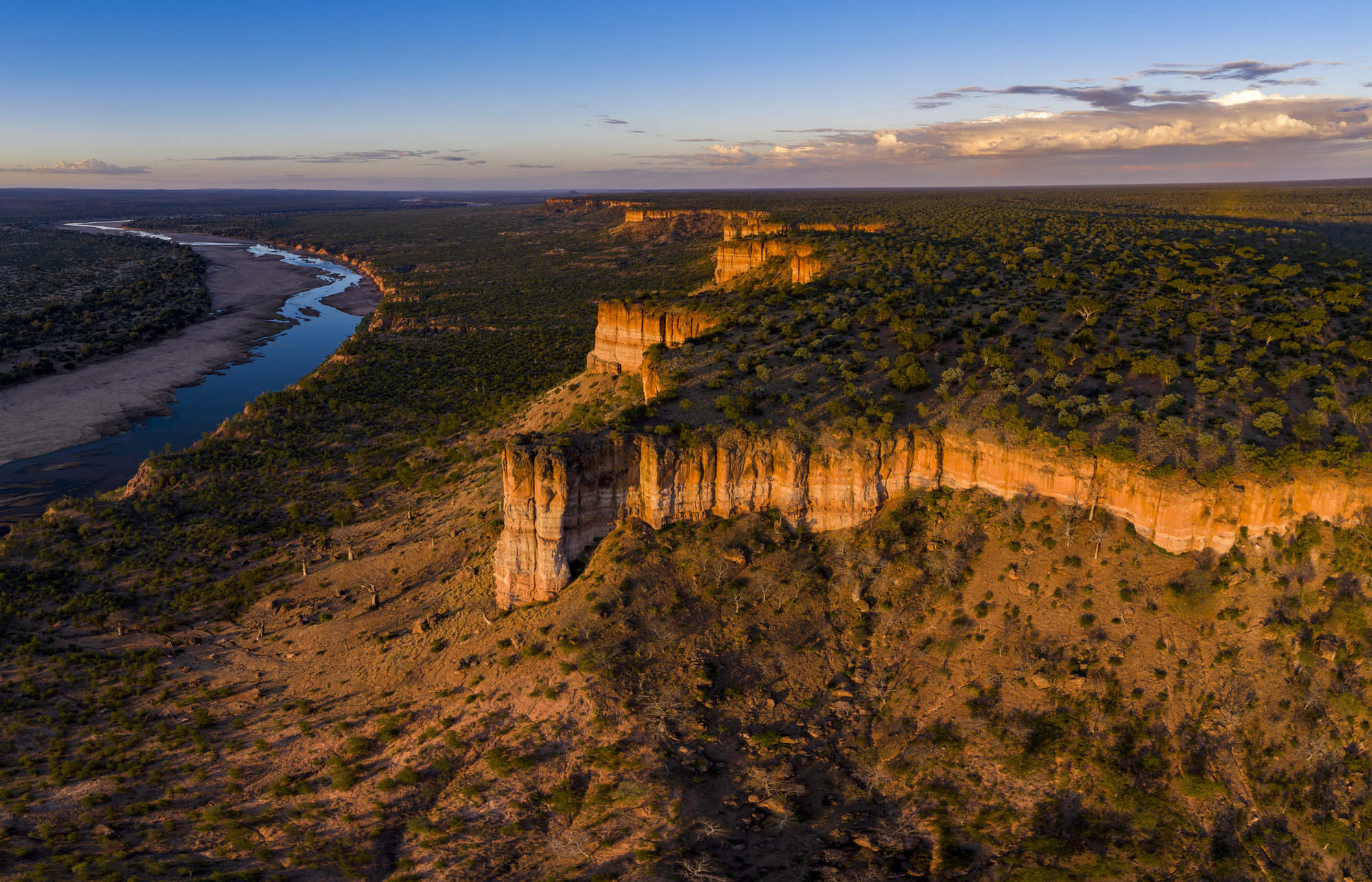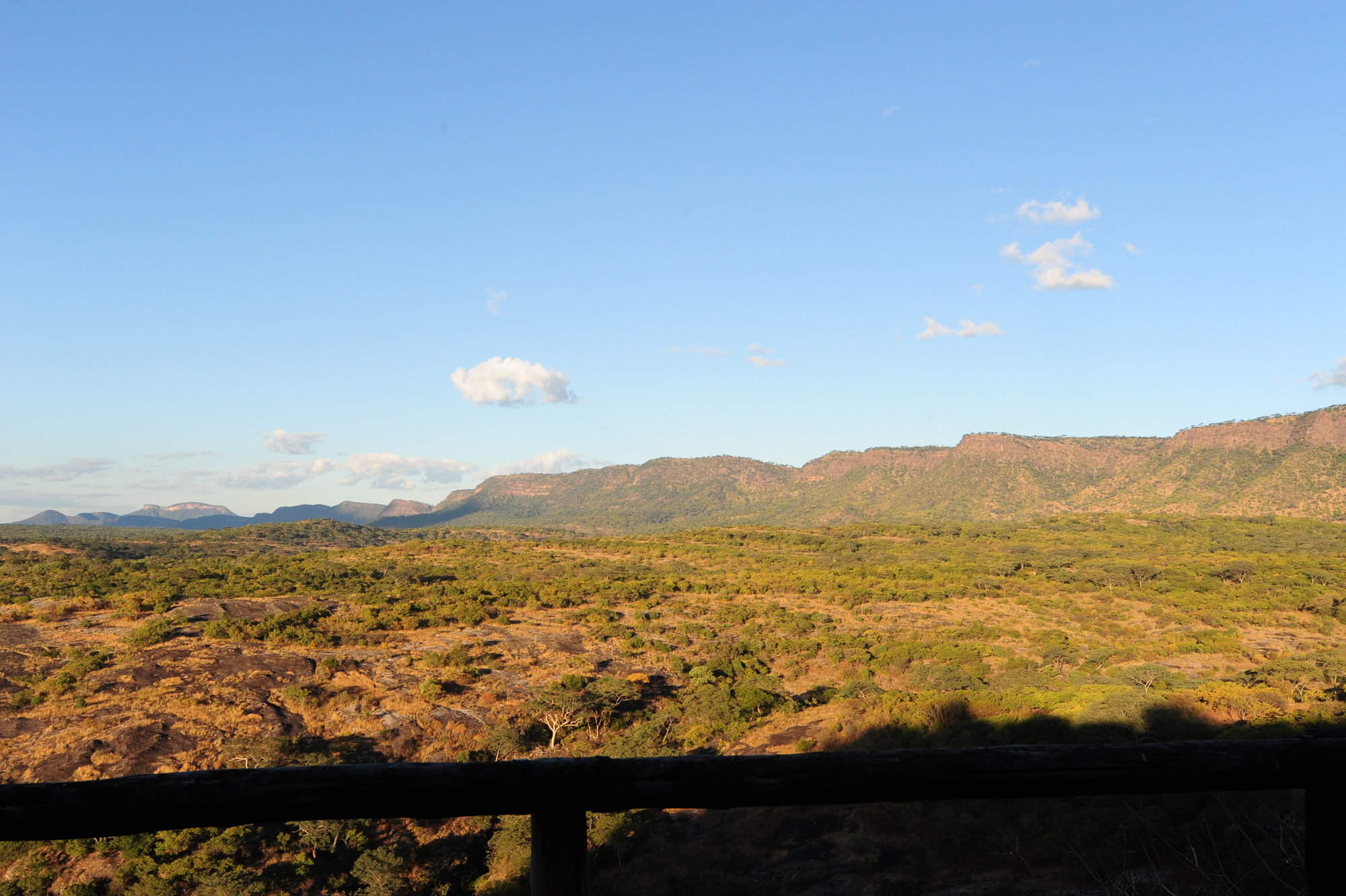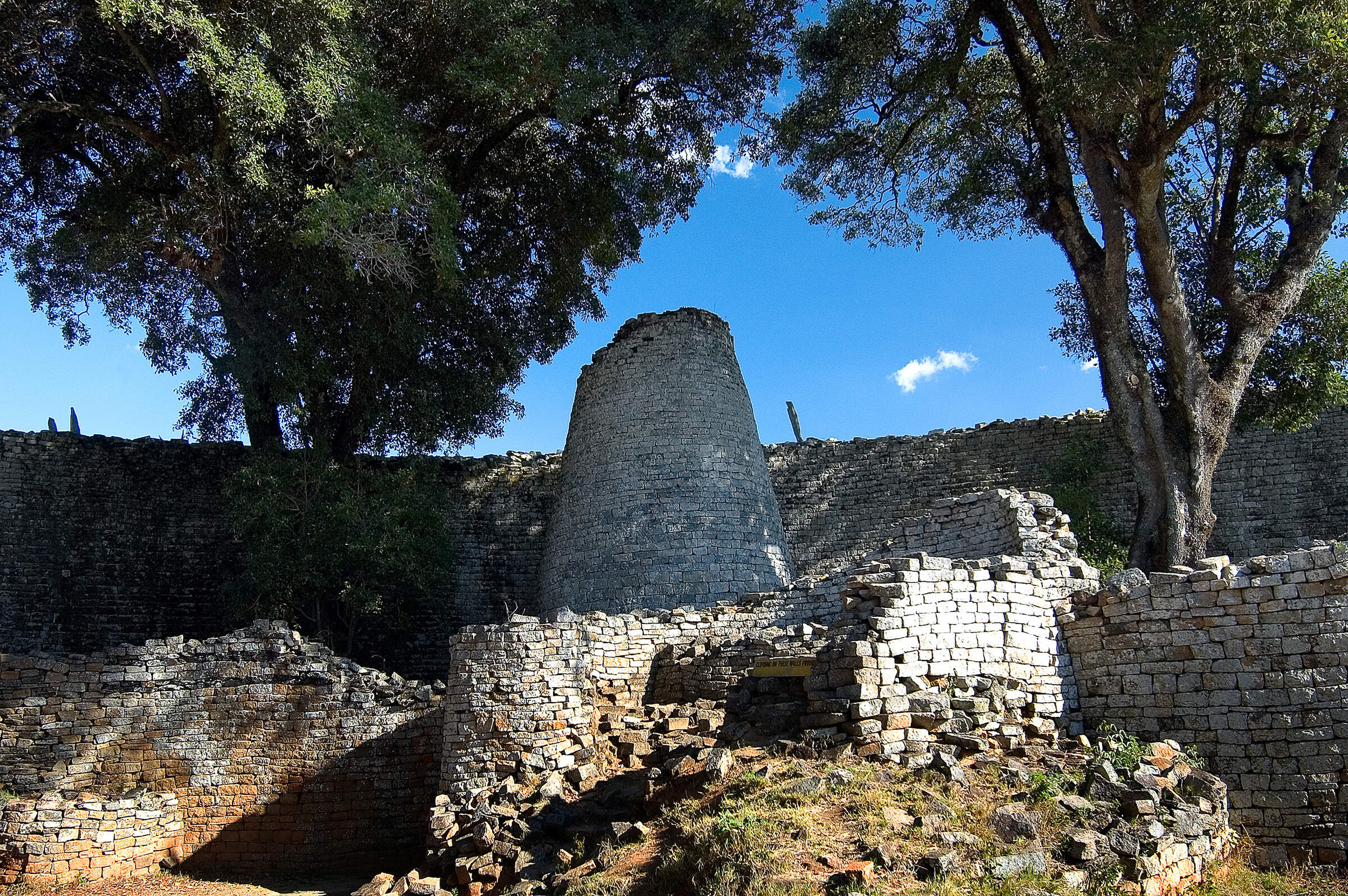Camp Hwange: Our full report
In the north-west of Hwange National Park, where the Kalahari's flat plains start to transition into rugged ...
... hills, you’ll find Camp Hwange. The camp combines a distinct "bush" feel with an emphasis on the safari experience and top guiding.One of the Expert Africa team first stayed on the site of Camp Hwange in 2011 before it had even been built. It’s in a quiet area of the park with few other properties, and we have returned several times since, most recently in July 2023. On each visit we have been impressed by our experience here – in particular the superb standard of guiding.
Accommodation at Camp Hwange is rather more solid that that at its sister camp Hwange Bush Camp with eight canvas-and-thatch chalets, all overlooking the waterhole in front of camp. Large gauze windows make the most of the view, while allowing a breeze to blow through and keeping insects out. In the hotter months, a ceiling fan over the bed helps to keep the air circulating. Each bedroom is simply furnished with very comfortable double or twin beds curtained by mosquito nets, a writing desk with a tea/coffee station, a wooden storage trunk, soft floor rugs and a small couch. Outside is a small porch set with chairs and a coffee table looking toward the waterhole – an ideal place to watch the sun rise.
The en-suite bathroom has a large walk-in, solar-heated shower, a washbasin with complimentary shower gels, shampoos, insect repellent and lip balm, luggage storage with safe, and a flush toilet in a separate cubicle.
Sandy paths link the chalets to the main area, a large, open-plan building beneath a thatched roof, with 180° vistas across to the waterhole, where animals often come to drink. Alongside a large communal dining table are a couple of seating areas with very comfortable sofas and chairs, and a small but well-stocked bar.
Camp Hwange’s firepit forms a focal point for pre- and post-dinner discussions of the day's events and sightings, usually with a drink in hand and some tasty canapés from the kitchen. It's also where guests begin their day with coffee and a light breakfast. One morning we were treated to the sight of a lone lioness drinking at the waterhole, so after a hasty breakfast we followed her by vehicle to find the rest of her pride; it’s the sort of thing that seems to be a regular occurrence here.
The area around camp is particularly good for elephant in the dry season, and you can spend a couple of hours in the early morning or late afternoon at the wood pile hide in front of camp, overlooking the waterhole. You may need a degree of patience as you wait to see what will come down to drink, but it's frequently rewarded by great close-up sightings.
Further afield, activities at Camp Hwange focus on walking and 4WD game drives, both morning and afternoon. The beauty of these is their flexibility, something that we particularly enjoyed on one visit when we were due to set out on a walk from camp, but instead jumped on a vehicle to investigate the sound of lions calling from a few kilometres away. We then picked up on our walking safari later in the day. With no set schedules there's a genuine sense of adventure, and this, together with the guiding team's exceptional knowledge and enthusiasm, creates a really varied and authentic safari experience. If you’re staying more than a couple of nights, you may also be offered the choice of a full-day drive.
We've had several fascinating excursions with Camp Hwange's guides, some of the most exciting being when we approached lion and elephant on foot (on separate occasions) to within 20m. While this was undoubtedly exhilarating, we have always had every confidence that the guides have been acting in a safe and responsible manner.
We have also encountered smaller species such as a juvenile python looking for a spot to hibernate, and the nests of Cape turtle doves, complete with blind chicks. At other times we have explored the rocky hills to the north of camp on foot, and have ended an evening drive, gin and tonic in hand, watching a pride of lions interact.
In recent years relatively few self-drive travellers have visited Hwange National Park. Thanks to this, and to Camp Hwange's location in a private 50km2 concession, much further west than most other lodges in the park, you’ll seldom see any other vehicles when out on activities. As Zimbabwe starts to show tentative signs of economic recovery we have our doubts that this level of exclusivity will last, but for now Camp Hwange offers an exceptionally private game experience in one of Africa's most diverse national parks.
Our view
We've been sending our travellers on mobile safaris with David Carson for many years, and we are very impressed with this, his first permanent camp, which continues his legacy of top guiding and unforgettable safaris. Camp Hwange is all about experiencing the wilderness first-hand, so if you're looking for five-star luxury this is not the place for you. If, however, your emphasis is on flexible, knowledgeable and charismatic guiding in very comfortable surroundings, then we think you'll love it here.
Geographics
- Location
- Hwange National Park, Zimbabwe
- Ideal length of stay
- We recommend at least three nights here.
- Directions
- Camp Hwange is about a four-hour drive from Victoria Falls airport. The first hour is on main roads in an air-conditioned minibus; the remainder is through the park in a safari 4WD. Alternatively, the camp is about two hours’ drive through the park from Hwange Main Camp. The drive time through the park varies depending on what you see, and can sometimes include a picnic lunch en route.
- Accessible by
- Fly-and-Transfer
Food & drink
- Usual board basis
- Full Board & Activities
- Food quality
- We’ve always enjoyed the food at Camp Hwange, no less so on our last stay, in November 2017. Meals are eaten communally, with guides and managers joining guests, which we feel adds to the experience. Dietary requirements can be catered for on requests with enough advanced notice.
Breakfast is served early, between 5.00am and 5.30am, in order to make the most of the morning light on your activities. Typically you can expect a cold buffet of fruits, cereals, yoghurts and pastries, with the option of a hot breakfast on your last morning, or before a pre-planned more leisurely start.
Lunch is usually served around 11.30am, but this depends on when you arrive back from your activities. We enjoyed scotch eggs with a variety of salads and fresh bread, followed by tinned peaches with yoghurt. Our lunch was served buffet style and proved to be the perfect light bite on a hot day.
Dinner typically follows drinks around the campfire. We were treated to a caramelised onion and blue cheese tartlet to start, with a main course of stuffed beef fillet with creamed spinach, rice and seasonal vegetables. However, the highlight for us was a delightful self-saucing chocolate pudding.
Part way through the morning activity you'll usually stop for a tea/coffee break accompanied by fresh muffins and a selection of homemade biscuits. Prior to the afternoon activity, guests usually gather in the main area for afternoon tea and cake. - Dining style
- Group Meals
- Dining locations
- Indoor and Outdoor Dining
- Further dining info, including room service
- Packed lunches can be arranged for your onward journey with prior notice; just let the kitchen know the night before.
- Drinks included
- Soft drinks and wines, spirits and beers are included in the price. High-end liqueurs, champagne, imported wines (except most South African wines) and spirits are not.
The water from the taps in the rooms is filtered and is considered safe to drink. Bottled water is also readily available.
Special interests
- Birdwatching
- Hwange National Park offers a good range of habitats which attracts a large number of resident and migratory birds. With some of the best guides in the park Camp Hwange is an excellent option for your birdwatching safari in Zimbabwe.
- See ideas for Birdwatching in Zimbabwe
- Photography holidays
- With a guiding team led by Dave Carson, one of the country’s leading professional guide examiners, Camp Hwange’s guiding team is one of the best. This makes it a fantastic option on a photographic safari to Zimbabwe.
- See ideas for Photography holidays in Zimbabwe
- Walking safaris
- For a wildlife safari in Zimbabwe, consider Camp Hwange, which has a very strong focus on top guiding. Whether watching wildlife by vehicle or tracking it on foot, you can expect to be led by incredibly knowledgeable and enthusiastic guides with a real passion for the bush.
- See ideas for Walking safaris in Zimbabwe
- Wildlife safaris
- All the guides at Camp Hwange are all experienced walking guides with an exciting mix of adventurous spirit and respect for animals and the bush. It's an excellent camp for approaching large animals on foot, and for more general walking safaris in Zimbabwe.
- See ideas for Wildlife safaris in Zimbabwe
Children
- Attitude towards children
- Camp Hwange has an official age limit of eight years old, but is willing to consider younger travellers on a case-by-case basis.
- Property’s age restrictions
- Camp Hwange normally accepts children only aged eight and up. Children under 16 may not take part in walking safaris.
- Special activities & services
- None
- Equipment
- Each chalet at Camp Hwange has a small couch that can open out as a bed for one child. For a family group with two children, one adult and one child would share a tent. Children may not sleep in their own rooms.
- Generally recommended for children
- Camp Hwange is very open with no fences, and dangerous wild animals frequently pass through. In addition there is a strong focus on walking safaris, which are not permitted for children under 16. We therefore recommend this camp for children of 16 and over.
- Notes
- Camp Hwange is an open safari camp and dangerous animals are likely to pass through; children must be supervised by a parent at all times.
Our travellers’ wildlife sightings from Camp Hwange
Since mid-2018, many of our travellers who stayed at Camp Hwange have kindly recorded their wildlife sightings and shared them with us. The results are below. Click an animal to see more, and here to see more on our methodology.

100% success

100% success

100% success

92% success

87% success

86% success

59% success

58% success

53% success

50% success

46% success

34% success

33% success

31% success

13% success

4% success

3% success

0% success

0% success
Communications
- Power supply notes
- The camp runs on solar power, but also has batteries, so power is available 24 hours a day. Each chalet has plug sockets for charging batteries, but these cannot power a hairdryer.
- Communications
- There is WiFi available but this can be intermittent.
- TV & radio
- None
- Water supply
- Borehole
- Water supply notes
- Each chalet has a flushing toilet and plumbed-in shower with solar-heated hot and cold water.
Health & safety
- Malarial protection recommended
- Yes
- Medical care
- There is a first-aid kit on site and the guides are trained in first aid.
The camp has access to Medical Air Rescue Service (MARS) for very serious incidents. - Dangerous animals
- High Risk
- Security measures
- All guests are accompanied to and from their chalets at night by an armed guide. Air horns are provided in the chalets to attract attention in case of an emergency.
- Fire safety
- There are fire extinguishers in all of the chalets and in the main area at Camp Hwange.
Activities
4WD Safari
Birdwatching
Guided walking safari
Night drive
Private activities
Extras
- Disabled access
- On Request
- Laundry facilities
- Included, but for cultural reason no underwear will be washed. Washing powder is provided in each chalet should guests wish to do their own hand washing.
- Money
- Each chalet has a safe for valuables.
- Accepted payment on location
- Any additional payments must be made in US dollars cash; credit cards are not accepted.
Other lodges in Hwange National Park
Alternative places to stay in this same area.
